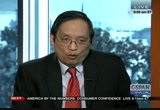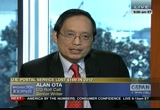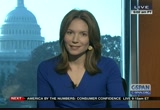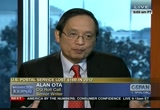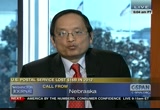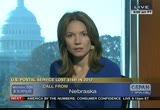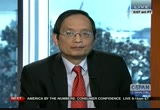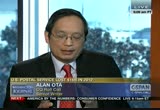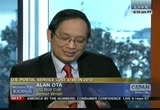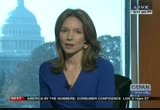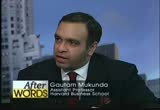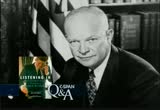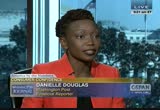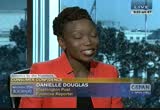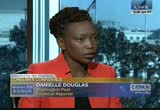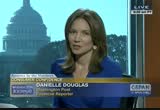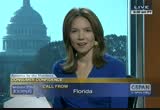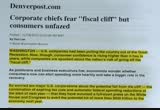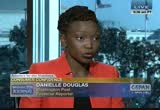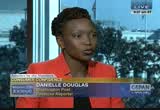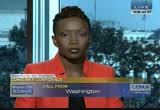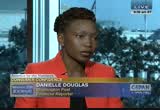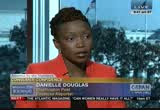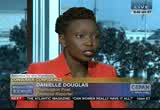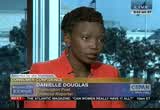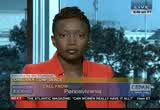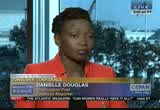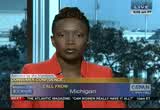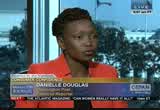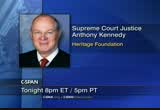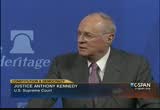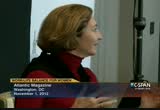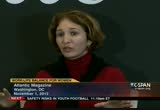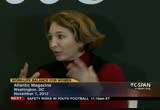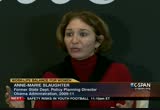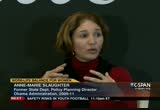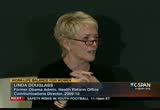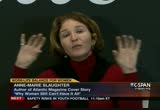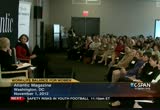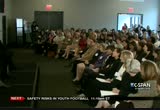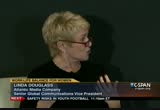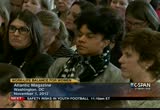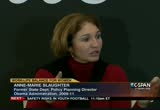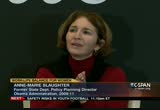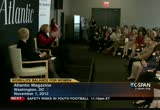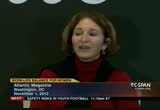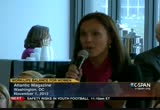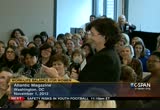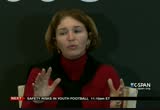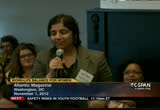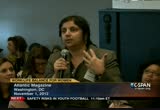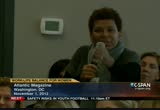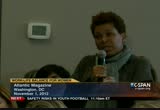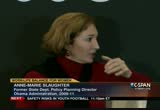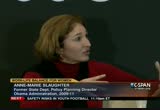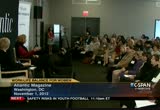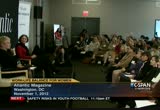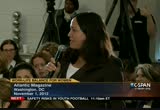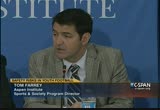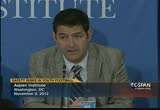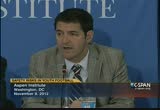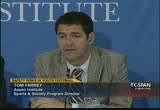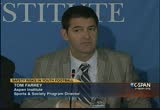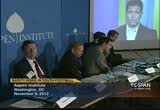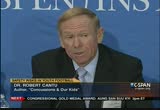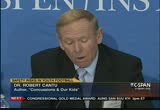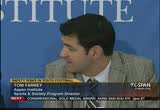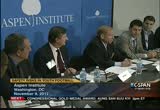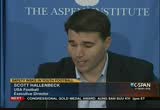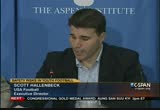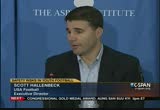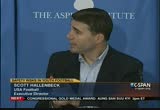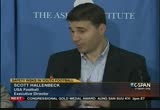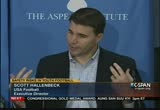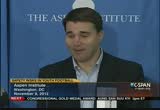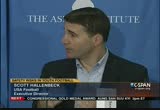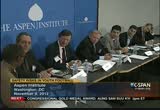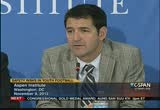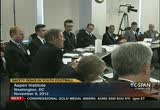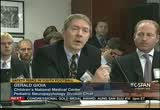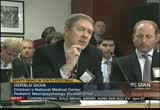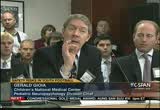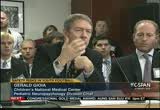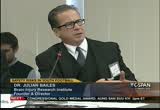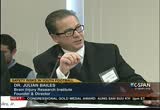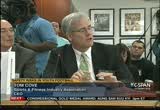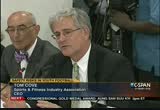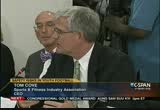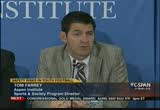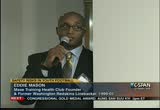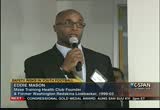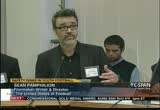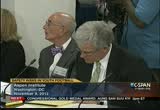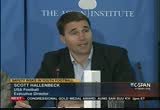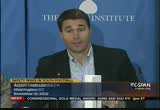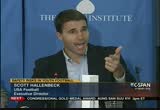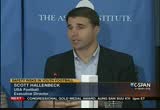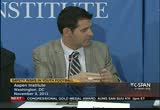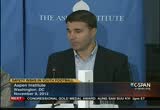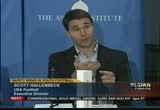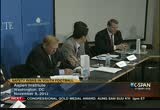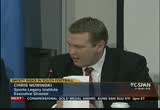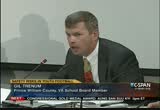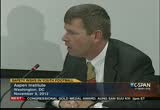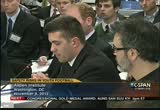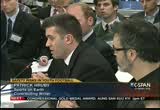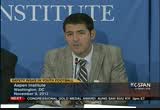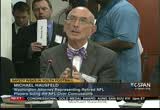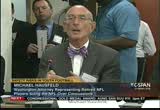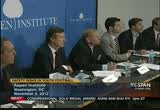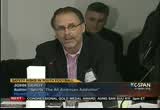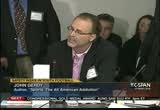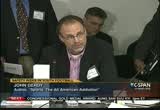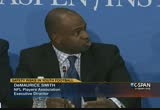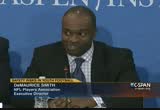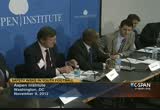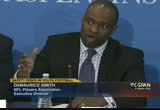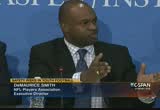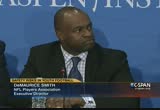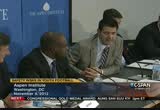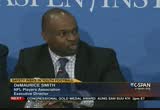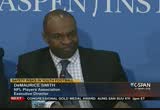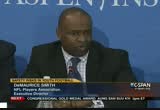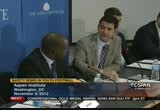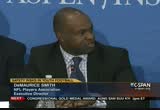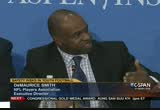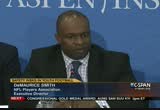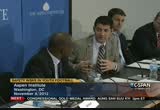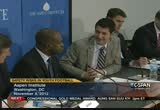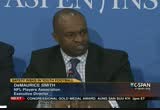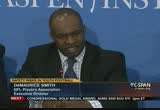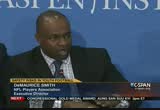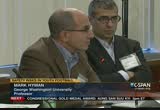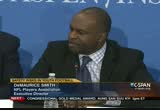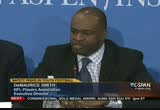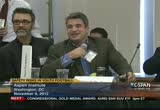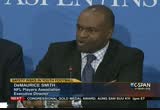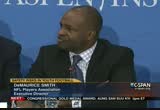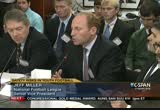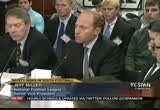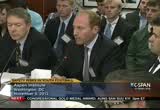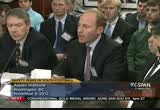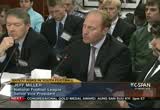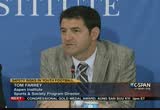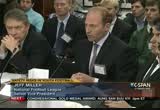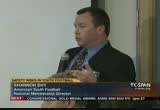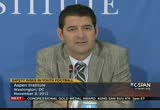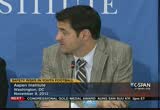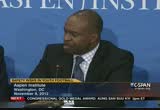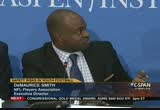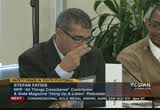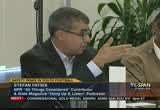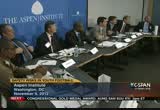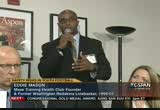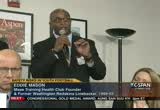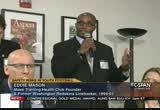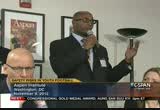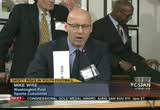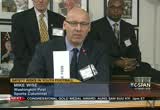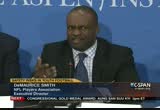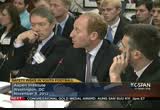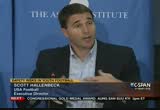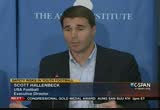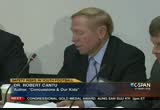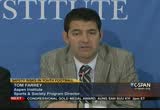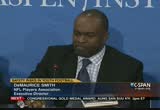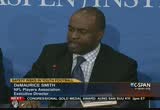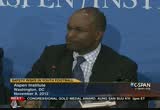tv Public Affairs CSPAN November 23, 2012 9:00am-2:00pm EST
9:00 am
yes, the prepayment. guest: guest: 5 wouldn't underestimate the pressure that is on both parties, maybe the pressure is on the republicans even more because they represent more of the rural districts. they really don't want to do anything that would make doorpost offices and the poor -- and the postal service go away. there is a lot of pressure on to preserve it. the caller was talking about republican talking points about the talking points are fairly tough. beneath that, there is a desire to cut a deal here. we have to kind of what what they are doing with their hands and the words that are coming out of the talking points.
9:01 am
the basic problem is really coming up with a bill that will able to get a majority of support within the house and senate and it seems to me that i think they may be getting close to that. as far as getting a more private-style of management, it is the sort of a tough not the they are trying to crack. they have several layers now at the postal service. i think what they are trying to do in the house bill is to create the idea that you have more of a private the best type of group of managers that could come in within a couple of years if the financial problems are not resolved by the steps that would be prescribed by the legislation that would perhaps be in the future something that would happen. host: the caller mentioned about unions --
9:02 am
do union see that as a way of breaking up the unions? guest: certainly, there has been -- there is a lot of pressure on to reduce the size of the workforce. they have about 500,000 workers. what is in the legislation is in sentence, payments, that would be made to encourage early retirement. they would try to reduce via attrition. at the same time, they also have this problem that they don't want to reduce the actual footprint, the actual geographic reach of the post office because that will mean elimination of all these rural post offices. that is really the box they find themselves in.
9:03 am
host: with the holiday shipping season under way today, we're talking about the state of the u.s. postal service. alan ota is the senior writer with cq roll call. republican caller, you are on the air. we are listening. caller: i am calling about the hours. they are open from 9:00 until 4:00 for the weekend on saturday three hours. they do not cater to the customer. that would be the first place to start. that's it. guest: they are talking about may be adjusting the hours. on saturday, they are talking perhaps about maybe not having any deliveries are handling of letters but they would have a package services so that maybe they might be able to have
9:04 am
longer hours for doing the packages on saturday but not dealing with letters. they are trying to find a way to tailor their services and focus on things that are really bringing in money like these package deliveries. host: nebraska, independent caller -- caller: i've got a couple of comments -- the postal employee that called in was all right on where he talked about the amount of money that the postal service has to put into opm and no other federal agency does it and no other federal agency tries to pay its way like the postal service does. if they had part of that money back, they could be right on top of it again plus, we talked about five ordered 83,000 employees right now. that is a lot of employees but if you stop and figure about new addresses they get every day,
9:05 am
that is a lot of different places to take the mail. if you stop and look at the price of fuel, when i was in the postal service, just a few years ago, we had a 3000 vehicles on the road. i am sure they probably have at least that many now and the speculators and oil companies are jabbing it to the federal government and the postal service and city governments and everybody else down the line and our military. that is not american at all. host: are you a retired postal caller: worker yes, i am. i retired in 2004. host: what kind of pension or retire benham -- retirement benefits you have? caller: they offset my benefits
9:06 am
for social security. they take out for my insurance that i have. health insurance, blue cross/blue shield and end up with $300 per month the. is pretty outrageous, isn't it, considering they counted me as having 23 years in there. i was a postmaster when i became legally blind. that is beside the point. you don't get rich off the retirement unless you have been there for a lot of years. host: so after 23 years, what do you get in social security? do they take out for that? caller: s, when you first retire, they are mandated by law -- mr. reagan and his troops, when they read it so security in 1983-1986, they came
9:07 am
up with federal employees retirement system. they were wanting to eliminate several services altogether. that was because of the benefits. if you have $1,000 so security retirement for your benefit ♪s. ts, it would offset your benefits by $1,000 also. you're supposed to get say 1275 and you get $1,000 worth of social security, they reduce your disability retirement by $1,000. host: got it. ♪ caller it doesn't leave you a whole lot oin there.
9:08 am
there were a lot of private, wealthy people who cut benefits to the people who are served by them and chop it up. you figure 300 different companies are running it, they are not going to be able run it efficiently and work together. guest: the caller points out that there is a lot of this dispute that has to do with the sort of basic mathematics of benefits that are going to be owed to the postal service workers that will be retiring in the next few years. really, the crunch time is really going to be over the next 5-10 years. they are trying to come up with a way of maybe restructuring
9:09 am
some of these payments that are required for the retiree health- care benefits, about $5 billion per year that will be paid and it will be over $50 billion overall. they might restructure that a bit and give it a little breathing room for the next few years so they can provide incentives for early retirements, and some reductions in facilities. and become leqaner and focus on more of the profit-making businesses and that would allow it to be viable and cover these expenses it has to pay in the years beyond. host: from twitter -- guest: i think that's right. there is a concern.
9:10 am
i guess what has been driving the pre-pre-payment requirement is the gloomy perspective -- will the postal service be viable or is it in the middle of something that cannot get out of? is it going to be able to survive? if it cannot, the lawmakers have decided that it is only prudent they should require some of these prepayments for the liabilities. these liabilities will not kick in 50 or 20 years from now. they will be kicking in within the next few years. what you have with the postal service work force is you have a baby boom component of that work force and those baby boomers in the postal service work force will be retiring over the next
9:11 am
few years. that is the challenge that they face in trying to come up with this compromise. host:usps defaulting on about $11 billion in 2012 alone? guest: right, they have not been able to pay the $5.5 billion over the last two years to what they are trying to come up with is a plan that will reduce those payments. it will be more than zero but reduce those payments to maybe one or two billion dollars per year and then increase the payments and the out years. the liabilities are based on studies and projections and the liability is there and they want to pre-fund it. it does not look like either party will support eliminating the pre-fund requirement but maybe they will give it some breathing room. there's a chance they can come
9:12 am
up with a compromise. host: on airline for democrats, last vegas -- caller: they always talk about closing the post offices on saturday but that's the only day they can get their mail. this should close the offices on monday. these republicans are constantly crowing about the constitution and i don't know what is in there. maintaining the post office is in the constitution so what we need to do is take a vote in the house of representatives -- you want the post of us or not? those who votes no, those districts will not get mail. they send these people to congress to represent them and if they don't want postal service, fine. the ones that are costing money in the rural areas, stop delivery to those districts. >guest: the caller has a couple of good points.
9:13 am
they are talking about eliminating six-day delivery of mail. they could negotiate that in a way that the delivery of mail would continue may be on saturday but maybe they would eliminate it for monday or tuesday. i think tuesday is the one they have been looking at. whenuse ♪ that is a day the usage -- there's less demand but that is the thinking. the caller makes a good point that while it is great to propose cutting services and putting in place base realignment closure commission and if you need to slash services or eliminate rural post office, is one thing to propose that but then vote on it and have your name on it and have your local post of is perhaps be
9:14 am
affected by that decision, that is a very tough thing for members of congress in either party to do. that could be one of the big impediment to getting this thing passed. host: one more fall -- phone call from florida, republican column. caller: i want to ask one question. he just mentioned that the amount of employees that the postal service has is 500,000 to? guest: yes, indeed. caller: i will change my attitude to the comment i made. when i started at the post of us in 1971, i understood that the post office had never made money. it always lost money and that is before i started in 1971. when i got into the post office, i was in a general post
9:15 am
office in new york. at that time, they were bringing in electronic eyes and machines and they introduced lsm machines at that time which is a letter sorting machine. it can sort 60 pieces of mail in one minute. there is a lot of manual boxing in the post office. for last seven years, i left in 1978, these machines were billions of dollars of electronics and they were coming in at that time. sometimes the electronic i could not pick up handwriting that they have improved over the years. at that time, there were several hundred thousand people working in the postal service as i understood and for years until about two years ago when they had a big problem and started to cut back and they had these
9:16 am
rural post offices with one postmaster for one post office, that did not make sense. guest: the caller puts his finger on one of the interesting facts which is that these postal employees really are almost in some ways a community resource. a machine that is able to read the handwriting and be able to discern how to deal with some of the issues they face in these local post offices almost has to be handled by a human being. there is a lot of pressure to retain those workers and those post offices. i think what we will find it is
9:17 am
ultimately what they will pass will preserve a lot of that footprints. host: thank you for being with us. coming up next, we are turning our attention to consumer spending and confidence heading into the black friday weekend and cyber monday. we will be right back. ♪ ♪ ♪ ♪ ♪ >> i can remember barack obama's speech in 2004 at the democratic convention that made him a national figure. four years later, without that speech, he is not a viable candidate for president. there is a brilliant speech at the cooper union in new york from london. it is a fantastic speech. when he ran for the senate --
9:18 am
barack obama gave a speech in 2004, he was running for the senate in illinois and he won but abraham lincoln lost. when you want to think about abraham lincoln in 1860, think about barack obama running for the presidency in 2008 -- if he had lost the illinois senate election, that is the level of national security we're talking about. >> we profiled historic and modern leaders to show the lessons that can be learned for those who have had the greatest impact on the issues of their time. this is on book-tv "afterwards" at 9:00 p.m. and midnight eastern on sunday on c-span 2. >> what about if the soviet union announced tomorrow that if we attack cuba, it will be a nuclear war? >> this thing is so serious.
9:19 am
we are going to be an easy and we know what is happening now. you've got to use something. something may make these people shoot them off but i don't think as well. i will say this -- i must keep my own people very alert. >> have to hang on tight. >> it is amazing that eisenhower tells him to have his people alerts. everyone is completely on edge so course they are alert and kennedy lapse. he jocularly says hang on tightly to some nice moments on this terribly tense day. they are able to joke a little bit with each other and especially during this crisis, i think, they had a sense of how lonely it is to occupy that office and how you're getting all kinds of advice, good advice and faulty advice, which kennedy got from his joint
9:20 am
chiefs. eisenhower knew about faulty military advice and was able to speak with his supreme authority about the dangers as well as the advantages of military advice. he was a very useful ally to president kennedy. >> "listening in," the secret recorded conversations of president kennedy on q &a." "washington journal"continues. host: we're going to talk about america by the numbers which is a weekly series we do. we want to focus on consumer sentiment and confidence going into this big shopping weekend. how is that even measured? we see reports that consumers are feeling good about shopping and spending money lately. >guest: consumer confidence is measured by asking a ranting -- a random sampling of five
9:21 am
questions. that also ask consumers about their own financial expectations and their financial conditions. two of the most troubled -- rep little ones are university of michigan. host: it showed that consumer sentiment rose to about 82.7%, the highest since july, 2007 and 60.8% in october, 2011. what does it mean for our economy? guest: sometimes there is a direct correlation between what we see in terms of how consumers feel about the economy and what they are willing to spend in terms of the holidays and in general. what we are seeing now especially when you look at the university of michigan reported that the optimism about progress in the job market is offsetting a lot of concern about the fiscal cliff and the possibility of tax increases and cuts to
9:22 am
government spending. host: when you look at consumer confidence and sentiment, what factors are in play? guest: a lot of times it has to do with how they feel about their own personal fan -- finances and how they feel about the job market and the prospects of finding employment or losing employment. there is a lot of concern still about the high unemployment levels but the idea that the housing market is improving and the idea that there are a lot more employers that are willing to slowly higher at this point seems to be reassuring consumers that there is some hope for the economy host: does consumer confidence have an influence on holiday spending? guest: it does to some extent. when consumers feel most constrained by their own finances, they are not willing to spend as much. a number of reports coming out in the last couple of weeks showed that despite concerns
9:23 am
about the fiscal cliff, people are willing to spend about the same amount of money they wanted to spend last year host: this is from "the washington post" - what are the expectations for this year? guest: black friday is traditionally one of the highest-grossing shopping days for the holiday season. it has been more so the last couple of years than super saturday which is the saturday before christmas. what might be a wild card is that last year when retailers decided to open early on thanksgiving day, we saw a fall off in sales. the first two weeks in deep -- in november. if we see that happen again, sales might not be as strong as people are projecting. national retail federation was projecting we would see about
9:24 am
147 million americans heading to the stores this weekend. that is a little bit down from last year but cyber monday which is another day for shopping, i think there is expectations that about 75 million people will participate in that day as well a host: i saw the figure earlier that they are thinking maybe $21 billion will be spent on black friday alone by consumers which would be up from $19 billion last year. here is the front page of "the baltimore sun" - what is the benefit to stores in the economy to open earlier? guest: on-line shopping is continually growing and represents about 4% of retail sales. online retailers are very savvy
9:25 am
how they are promoting themselves. brick and mortar stores feel they have to get out there as quickly as possible if they want to compete with those kind of deals offered by amazon or other places. some people are opening at 8:00 on thanksgiving day or 9:00 or 10:00. as much as they have been protested, consumers showed last night that they're willing to come out hos =. host: we saw this happening in 2010 that led away was making its way back. di it help? > guest: i think it did. we saw a 6.3% increase over 2010 last year. that year we sell wal-mart and k mart and other big box retailers instituting layaway which went away when the economy was doing
9:26 am
better. host: we are talking with danielle douglas of "the washington post." our lines are divided differently this morning -- if you plan to spend more, dial the first number -- spending alas, the second number, if you are going to spend about the same, the third number. the numbers are on your screen. we want to hear from you this morning. our first caller is from consul alabama and he plans to spend less. caller: i am planning on spending the last. in capitalist societies, the problem is that we don't produce enough and the problem seems to be that we produced more than we can consume and i was wondering if you guys had it is solutions to the problem without us having to consume more?
9:27 am
guest: charles mexican couple of good points but it is a delicate balance. consumer spending accounts for about 70% of the gdp which makes holiday season shopping significant. will contribute to about 36% of retail sales for the year. many economists look at the idea that as the consumer spending starts to trickle off -- consumers are concerned about their debt and have indicated they are willing to spend less and be more judicious about their financial status -- there has to be more of a consideration of increased production and we are seeing a small but gradual increase in manufacturing. that bodes well for the economy in the long term. host: you mention the cyber monday -- what impact will that have on overall holiday sales tax guest: it has become really
9:28 am
important the last couple of years. it took shape maybe 2008-2009. the national retail federation which pushed cyber monday because they realize that people were still shopping at their desks -- they are projecting about 98 million. host: is it becoming bigger than black friday? guest: no, it is growing and it is an exciting part of the retail pie but it will not overshadow black friday at least not anytime soon. black friday is a tradition. it is almost as much of a tradition as thanksgiving. people still want to go out. they enjoy the thrill of a hunter and a bargain even though online shopping offers as many deals sometimes. host: the business section of " the new york times "has this
9:29 am
photograph of four women who handle social media for the mall of america and minnesota -- it is a new way for retailers to do business. guest: it is pretty amazing -- there are so many apps that will log all the black friday deals. they will give you alerts and there are ways you can check off what you want and find the best bargains which plays on both sides. for some brick and mortar stores, they don't want show rooming shoppers go into their stores and look at the product and tested out and go on line and make sure they can find it cheaper on line. many retailers are trying to find ways that they can to price matching or they are trying to find ways to incorporate their online sales with their in-store
9:30 am
sales. host: we will go to hollywood, fla. who is planning on spending more? are you there? caller: i'm here. i do plan to spend more this year a. am confident in the economy and i think things are changing. i will spend a little bit more for my family gets of this year. host: much more and how was it different than the last couple of years? caller: i plan to spend at least $500 more. i could not do that before because i was scared of the economy. things are not looking so good. my job was not stable but things are getting a little better at my job so i feel confident of this year. host: what to do for a living? caller: i am a school social worker. host: you felt your job was in jeopardy?
9:31 am
caller: exactly. host: what gave you confidence that it was not? caller: obama has gotten back in office, the people with jobs are more confident and encouraging us to do more, the government is really in favor of the schools and our job is not in jeopardy is what we are told -- what they are telling us and we feel confident in that. guest: i am getting a sense of what a lot of consumers are feeling now that even though unemployment is high, there is improvement in the job market, a sense of stability that after the election. retailers were concerned that the election would suck the attention away from holiday spending and shopping. for some consumers it it seems it has stabilized their position and where we may go in the next few years host: this is the "denver post" headlined --
9:32 am
guest: that is an interesting diversion of where the employers feel about the pending fiscal clef and how their employees feel. for the heads of a lot of businesses, they're taking into consideration that if we were to go over that particular cliff or hill that some people call it, the impact will not necessarily take effect right away and they will have to reconsider how the budget for the coming year. employees have that feeling and all this other crises we have faced less fear years, somehow the government finds a resolution. there is not as much concern that it will be complete doom and gloom. there is coffins we will find a
9:33 am
solution that will not jeopardize people's fragile but still stable sense of financial well-being. jacksonville, to fla. houppelandes to spend less. caller: i'm going to spend less because i am going to be teaching my children that we are not consumers. we are human beings first. most of the stuff is just that -- stuff. it is junk and i don't need any more don't in my house. the current economic system is crooked and corrupt and every aspect of our life because of this has been monetized including our schools, our prisons, and it leads to corruption. i will teach my children that we are human beings, part of the human race, one human family, before i or anybody else is a consumer. host: move on to diane in jackson, mississippi plans to
9:34 am
set predicts spend the same period cal. caller: i didn't not get a chance to spend much with the economy the way it was. it was slow at my job and got laid off a lot. i said with elderly people -- i sit with elderly people. work has been really, really slow and i could not be spending a whole lot of money but i would love to now. after this holiday, if it picks up maybe next year, i hope i will give a little bit more. host: did you go out shopping this morning? caller: i went yesterday. host: christmas shopping? caller: i bought my grandbaby some stuff.
9:35 am
host: what were the lines like guest today? caller: it was ok but i had to really budget my money. i had to buy some cheap stuff. host: did you find good deals? caller: i did, i cannot complain. i would like to add to this -- i agree with the lady that got through speaking just before about the economy and how the system works. i understand what obama did when he said he had to make the cut with a higher tax payers. i feel if we take more from the people who have the most and put it into the ones who try to do
9:36 am
and i'm not talking about the ones who have nothing going for themselves but the ones who but still have trouble -- you know what i mean? host: brought up a point about taxing wealthier americans -- she brought up a point about taxing wealthy americans? is it broken down when retailers look at how much is expected to be spent? can they determine or predict how much will be spent by the different income levels in this country? guest: they have the possibility of doing so. there was a trend in retail and over the last couple of years where discount retailers do extremely well as well as luxury retailers. on the luxury end, it is not the highest earners purchasing these goods. it is aspirational consumers, folks who are in the middle
9:37 am
income bracket or considered middle america and in terms of their taxes are going out there and spending money on these luxury items for the idea one day being in that particular stratosphere. it is important for retailers to understand the consumer but consumers are not as black and white. there is quite a gradation. host: our luxury retailers doing? guest: have been doing fairly well in the last year and they are anticipating pretty strong sales for the coming year. a lot of luxury retailers were smart in that they started to create off brands that were a couple of hundred dollars cheaper than the normal goods and that has given them good returns within 2010-2011. we have seen people starting to purchase the higher end items, not quite christian lubitton but
9:38 am
that company is doing well. it is still happening with the barbell in fact where the high end and the low end is doing well. host: what about below and stores like dollar general? guest: wal-mart to some degree is on that end but department stores are in the middle. host: bellevue, washington, you are planning to spend more, why? caller: as my family gets older and need the last and we have been very lucky, i have become more conscious of people who have not been as lucky. for the first time ever, i will go out this weekend and take care of the first three families and that will give me time to hook up with other organizations and work it that
9:39 am
way. basically, my shopping is for people who have not survived in the economy the way i have. host: what is it like in your area? are there more of those people? caller: there seems to be. i don't know the cause may be as my family grows out of the kids stages and i am more conscious of it or whether groups are doing a better job advertising it and getting the word out. i have become more conscious of different social programs and churches and employers, etc adopting families or children. and asking for help to provide christmas for them. host: on not sure if this is in your bailiwick. i'm wondering if that translates to charitable giving. guest: sometimes but not always.
9:40 am
in the washington area, there has been a steady decline. has slowed in the last year or so, charitable giving, because even with individual families giving as significant as that is, corporate giving seems to be more important to many nonprofits as they plan for what they can and cannot do for the community. we are seeing consumers be a little bit more charitable and more thoughtful and how they look at how everyone and their community is doing. it is important what the curly -- what the caller said earlier about teaching her children not to be materialistic. i think we still see americans open as to how they look at the holiday system -- season and the significance of being thoughtful and thankful and expressing that goodwill to all. host: here is a tweet --
9:41 am
like land, fla., you are planning to spend the same? caller: good morning. i have a cold this morning. the only comment i have about the economy or spending at christmas time is i basically spend the same every year. once we get down the road end re-tool china under import taxes, we won't have any problem balancing the taxes. we hope we will have a good year coming up. host: buy america movement, does that have an impact? guest: think so, more retailers have more distribution plants in this country. is a slow growing movement in terms of dealing with labor issues and dealing with making
9:42 am
that move. as consumers become more aware of the products of their purchasing benefit americans in this country, we see retailers reacting to that. host: the stock market opens monday morning and we start seeing numbers about black friday and super saturday, how much the markets react? guest: is difficult to say. when we see consumers lining up at 8:00 on thanksgiving day and if there is a consistent volume of people going out to the stores at that time, i think markets may react well. host: will have to wait and see on monday. watching cybers monday close led -- closely? guest: it has become an increasingly important part of the overall shopping season.
9:43 am
on-line retailing is starting to grow so large. it is something they will continue to watch but not as weighty as the performance of black friday and now black friday eve and saturday and sunday. host: could this diminish concerns the market might have over fiscal cliff negotiations? doubtful guest:, i don't see that. there is still a lot of concerns as to what congress and the ministration will be able to do by the end of the year. as much as consumer spending is significant to the economy, the two are on separate plants as how the market used them. host: why is that? guest: the idea of the fiscal clef -- the negotiations behind them -- speak about certainty in the marketplace. the markets need a certain level of that to feel comfortable and perform well.
9:44 am
we may see a bit of an uptick in the performance but there is still looming concern of our -- of whether or not there will be an agreement on taxes and government spending. host: we will go to massachusetts, he plans to spend more. caller: good morning ladies, you look attractive and colorful this morning. i will spend a little more because my gran mom -- my granddaughter is about a year old. as a society, i think we are consumer-based. after the financial crash of 2008, i know myself, i cut back and everyone cut back -- businesses, personal spending -- as americans, it is ever -- it is in our nature to spend because we are constantly
9:45 am
bombarded by images to spend. if you take it as a behavioral pattern of an alcoholic who was in a car accident and stops drinking for a while and then did not really go on to correct this deficiency, we are just spending. we don't know about the fiscal cliff. they don't know what it means and i think the vast majority of consumers don't care. it is all about them, they're spending, their lifestyle, their habits. people will spend and that is pretty much my opinion. guest: if you look at what consumers are willing to spend this year, it is getting back to the pre-recessionary levels. i think in 2007, folks on average spent about 127 predicts spent about 100 -- $727
9:46 am
and this year is it -- is about the same. it is close to what we were saying in 2005 and 2004. it has been grinding along and consumers seem to have short memories in terms of financial strain. they are starting to return to where they are willing to spend on their family and willing to spend on themselves much like they were before the recession. host: college point, new york, plans to spend the same, go ahead -- caller: some of my thunder was taken away from the previous caller but with the layaway plans, the big box stores, there is more evidence that their short-term memory. people are willing to spend more than they can afford
9:47 am
particularly on garbage. fillet away is just a plan that is good for the economy but the life away -- the layaway is a plan to get people to spend more than you can afford. if you cannot afford it, don't buy it. i am on the east coast which is getting over hurricane sandy and people don't have anything left. host: you said you plan to spend about the same. how much did you spend or plan to spend this holiday season? caller: i was trying not to go into my personal story but i am disabled. i have diabetes so i don't really spend much on anything. that is not really the point. guest: as much as consumers seem
9:48 am
like they are having short-term memory and starting to return to pre-recessionary levels, we are seeing consumer debt levels come down. that could be an indicator as much as americans are very concerned about consumption, they are also very concerned about their financial well- being. it will see whether they will cancer each -- cancel each other out. there are some trends that bode well for overall financial health -- the idea that debt levels are starting to decline is a good thing. host: about whether or not holiday spending helps our economy -- here is holiday sales and the economy --
9:49 am
how does that compare to years past and what impact does it have? guest: some people are predicting $700,000 which would be phenomenal considering last year it was about 606,000 seasonal workers. on-line retailing does not have a substantial impact and temporary workers. amazon says they will hire about 50,000 people at their distribution fulfillment centers. kohl's saytarget and they will hire more workers but last year, 30% of seasonal employees were able to get your brown positions once the season was over. -- to get a year round positions once the season was over. host: planning to spend less, go ahead -- caller: people are making
9:50 am
comments about the holiday. every year, we go through this. the contras as get a good education and be good at your job and spending money the way you want to spend it. people will come out at christmas and take care of their kids. if you work all day long and cannot buy the stuff with your own money, you might as well stop working. i don't care how bad the economy gets, people will still spend money. year after year we see commercials and people still buy a pack of cigarettes or spend $30 for gas. what are you working for? you have to spend it. what's the use of having money? guest: i agree that you should be able to use your money any way you want but it is important for folks to pay attention to
9:51 am
their long-term financial stability. that means a mixture of spending as well as saving. and investing. earlier this year, there was discussion that consumers are saving more, not a grand amount more, but they are looking towards that end of you have disposable income, it makes investing something to be encouraged. you want to keep it balanced. spend the money that you have as you choose and as you see fit but also save enough to protect yourself in case of another financial crisis or any other economic tumult in your own life. host: we are talking about consumer confidence and consumer spending in this holiday season. danielle douglas is with "the washington post." this is a gallup poll that came out recently showing with u.s. adults estimate their total christmas spending will be comparing november, 2012 to last
9:52 am
year in november. what is the impact of this? what do you make of these numbers? guest: it shows we are getting back to a point where consumers feel more free with their money. there are people who have enough money who can spend more than $1,000 on their total holiday shopping. it could bode well for the economy. there's always this thinking of what consumers tell pollsters and let the wind up doing. we see the interest and excitement about where the economy stands but it might not necessarily translate into what actually happens.
9:53 am
host: a couple of callers have mentioned ads and getting people out to spend. is that a positive impact for retailers? guest: if there is a good deal attached to that ad - when you have door buster deals for a flat screen tv and retailers are smarter and a marketing, you have multiple marketing levels and you're kind of marketing in television ads and consumers get the picture. if they are looking for a particular item, that marketing will translate to those retailers because they will be able to find something they are looking for. host: we will hear from iowa next and she plans to spend this same period last caller: year we did not spend anything and this year we are not spending anything. we're on social security and my race was $13. you cannot buy anything with that.
9:54 am
since that time, i have had a stroke and we have medical bills. we are not buying anything again this year. host: what about the demographics of spending? can the calculate which age groups spends the most during this holiday season? guest: it is easily teenagers and people in their 20's. you can make the assumption that their concerns are not as weighty as folks who are a little bit older. when you go out to black friday, the stores are flooded with teenagers getting video games, sneakers and these things with a little job they have and they're willing to spend that income on those items. host: michael and west plant, michigan next plans to spend less, go ahead caller: good morning, ladies.
9:55 am
danielle, you look lovely this morning. guest: thank you. caller: i believe this is the last hurrah of american consumerism. this is due to the downward economic spiral. that will continue, mark my words. , over the next 10-15 years. because the politicians work for the rich, let's face it. they get the tax prabreaks and the jobs shipped overseas and this will continue. this is going to continue. we are a two-class system, the rich and the port. poor. i have empirical evidence to support this. the rich are getting richer and the middle-class is disintegrating. we are in the last stages, i believe, of american consumerism and consumption.
9:56 am
there is nothing to support consumption in the next 10 years. i am spending less because i have less. i am a retiree and everything is going up, prices across the board, and i have to protect my future and i have to survive. i want to let everybody know that our politicians from both parties, who can afford these $50,000 dinners which are fundraisers? this is ridiculous and we have been betrayed. our politicians are working for the rich. from: let's get jim parsons, west virginia, planning to spend the same, go ahead caller: i want to reiterate what the previous caller said. i think the administration did not make clear enough and does
9:57 am
need to make clear that as far as spending habits, our country is hollowed out economically. host: what do you mean by that? caller: it does not take a rocket scientist to come to the conclusion that if we don't make things in this country, that is a lot of spin off the comes from things being manufactured from our own country guest: he makes a good point. many economists say consumption will only last a significant part of the gdp for so long. if you don't start paying more attention to manufacturing and actual production, it will do a great disservice to our economy. we are seeing a marginal increase in manufacturing. i think that bodes well for the future of where the economy will be an overall gdp and whether there will be and not significant change is difficult to tell. there is still a ways to go and
9:58 am
labor relations and how workers should be treated and paid. until we can come to some kind of agreement on workers' rights as well as the need for this country to be as much producers as consumers, we will have trouble in seeing an increase in manufacturing growing substantially. host: will leave it there, thank you for spending some time with us. guest: had a great time, thank you. host: that does it for today's "washington journal" we will lead back at 7:00 a.m. eastern time tomorrow. enjoy your weekend host: caller: [captioning performed by national captioning institute] [captions copyright national cable satellite corp. 2012]
9:59 am
today'ss a look at schedule and cspan -- next, the former state department official anne-marie slaughter, talks about her " atlantic monthly"restored. then a discussion on traumatic brain injuries young kids face when playing tackle football. after that, the nobel laureate is presented the congressional gold medal at a ceremony with secretary of state hillary clinton and former first lady laura bush. later, another gold medal ceremony honoring golf legend arnold palmer. we will hear from him and his onetime rival jack nicklaus to speaks about arnold palmer's contribution to the game of golf and his work as a humanitarian. tonight at 8:00 p.m. eastern
10:00 am
here on c-span, supreme court justice anthony kennedy's featured remarks at the heritage foundation lecture series. here is some of what he had to say. he had to say. >> the constitution gives us our identity. the constitution gives us our self i dignity, authentication, our self-esteem, defines our purpose, defines our mission, defines who we are as a people. we come from many ethnicities, nationalities, religions, and yet we are bound together as one people because of our allegiance and our respect and our reverence to the constitution. and this is a link, a tie, a bond to our history and our
10:01 am
heritage that is unique or almost unique in the world. this tie that we have to our constitution, that defines us, gives us stability and a purpose and a mission to our people, and it is the envy of the rest of the world. >> next former state department official talks about her cover story entitled "why women still cannot have it all." it is the most read story in the magazine's history. she talks about the challenges of a balancing her work and personal life as a mother and a life. she'll let the state department in 2011 and now teaches at princeton university. she is joined by all linda
10:02 am
douglass. this is one hour and 10 minutes. [applause] >> i guess we were right that this piece has caused great conversation and touched a nerve in many places. caused a debate to take place around the country. you did not know what you are getting into, did you? first of all, before we start our interview, let me introduce anne-marie and tell you about her background. she is a university professor of politics and international affairs at princeton. if you have read the article you know that from 2009 to 2011 she served as deputy director of
10:03 am
policy planning for the state department and was the first woman to hold that position. upon leaving she received the distinguished service award for her work in leading the quadrennial develop and review as well as the meritorious of honor award from usaid. a civilian service commendation award from the supreme allied commander of europe. obviously very distinguished -- prior to her government service she was the dean at the princeton woodrow wilson school of public and international affairs. she has written six books. numerous articles for newspapers, magazines, many television appearances, and we are very fortunate, as elizabeth was telling you, that she is now a contributing editor to the new channel on "the atlantic." hopefully a great place to explore issues of gender balance. with that much, i will talk to her for a while and then i will open it up to you. i imagine you have many questions, and i apologize, i
10:04 am
have a little cold. as we start, even though i am assuming you have read the article, i want to go ahead and ask you to tell us what you realized, a very short summary. what you realized after doing this dream job of yours and trying to raise your two sons at the same time, and maintain your marriage, i want to throw that in as well. there is always that. [laughter] what did you finally say to yourself?
10:05 am
>> the first lesson -- i had been really blessed in managing to have kids and a husband and a career as an academic. i had known the flexibility was extremely important. i did not realize it was indispensable. that is the first thing i learned -- that flexibility had been indispensable to my being able to do what i wanted to do. once i realized that obviously the vast majority of women do not have that flexibility i understood the choices that a lot of women are making much better than i had before. you can do it -- you can make it work. as i wrote in the article, you can make it work if you are superhuman, rich, and in charge. preferably all three, but at least one of the three. the other thing i learned -- and i said in the article, but i can say it more fully here. i went back to princeton and
10:06 am
everybody said, why did you leave? i would say that my tenure was up. it is not unusual, academically. they were fine with that. they said, what is next? i am back in teaching and happy to do it. i would have left anyway even if princeton had given me an extra year or two years because i had two teenage sons and they need both of us at home, and i do not want to miss the last four years they are at home. i could see myself being devalued in the eyes of the person i was talking to, which i had to say was a new experience. i am used to getting a lot of positive reinforcement for being a role model. suddenly i am getting not quite the look over your shoulder and find somebody else to talk to, but clearly i am going down in their esteem. that was a revelation. people said, what a pity. what do you mean, what a pity? this is something we should be supporting. that really kind of knocked me over.
10:07 am
i realized -- i do not think i was conscious of evaluating it, but suddenly people were saying, if you are committed enough you can make it work. i realize, this is not individual, this is structural. if we really are going to get where we all want to get, which is 50% women at the top, then we really have to make some changes. >> we certainly want to talk about how women get to the top and how they manage -- let's talk a little bit about you for a second more. did you feel like you made a sacrifice? you often hear women tell stories about the choices they make along the way in their careers when they step away from their job or turned down a promotion. i am curious to know whether you thought that was a sacrifice you were making?
10:08 am
>> i have been thinking about this word sacrifice, why we call it sacrifice. leaders sacrifice their families for the sake of the nation -- how did i think about it? on the one hand, it kind of felt like i did not know who i was any more. if you had told me two years prior that i would be possibly in mind for a promotion to higher office -- there are not many offices higher up, they are all great jobs. you are going to say no -- i would say, that is not me. i would never say no. part of it was going after the factor that i was not going to do something i did not want, but i was not going to do it not only because i thought my kids needed me, that is the easier part -- your kid needs you, you are there. it is because i realized that i
10:09 am
did not want to look back at the end of my life and have missed the last four, five years of my children at home. i had a son who turned 16 yesterday. parents at my stage -- he is going to be gone before i know it. and i treasure that time. it is a choice. it is not a sacrifice. it is saying, i want this and i am never going to be able to have this back and i hope i will still be able to have the other. if i cannot, so be it. >> you are talking clearly about a lot of women who feel like they have to choose somehow between a career advancement or a career and their family. but why don't you think men have to make that very same choice? >> my father and brother informed me loud and clear they had made similar choices. i learned a lot.
10:10 am
my father let me know he always raised me to have a career in virginia in the 1960's, which was not normal for men in the 1960's. he saw a man go through divorces. he saw women getting less than nothing. he also let me know if he had turned down a couple of things and he could have more time with his kids. one of my brothers certainly did. this is hard -- there is no question guys make those choices. there are many guys out there who want to be able to make this choice is, wants to be able to actually be full partners with their spouses and feel like they cannot.
10:11 am
it is still true, however, that it is much easier for a guy to have the career he wants and a family -- the joys and pains of raising a family. it is much easier for guys to do that and a woman. if a woman does not have kids, there are not many obstacles. i am not saying there is no sexism out there, but basically we can do whatever we want to do. when we have kids, we are far more likely to have to step back, to compromise. not to drop out -- i hate the term drop out. we only use that term with respect to people who fail high-school and women who decide to work differently. it is much more of a women's issue, and yet to fix it -- it has to be a human issue, a social issue. we know guys feel that way, but
10:12 am
if you only talk about it as parents you are ignoring the huge been staring you in the face. >> what is the story? do you think there is a biological difference? you did talk about that in your article. i know this is part of what the controversy has been about. you say that man when faced with a choice between family and job would to jobs, women would more likely choose family over job. that really seems to indicate you think there is an actual difference other than just workplace conditions between men and women? >> this is so hard. i have been doing a lot of reading. there are some biological differences. nature does sort of make sure that we do bond with those screaming little bundles of joy, right?
10:13 am
so there are some biological differences. there has to be, if you think about the way evolution works. but a ton of sociological differences. one of the things i looked at -- if you put a baby dressed in purple rather than a pink or blue in front of women and men, they will interact totally differently with the baby depending on whether they think it is a girl or boy. the socialization starts very early. i do not know. i know empirically, and statistically lots of women who have written would say, one woman wrote me last week to say, i work and my husband works, somebody needs to be home at 6:00 for the baby. my husband said, let's get a nanny. i said no. at some point a parent needs to be there. at that point, your view is you have to be there, you are the one to make a trade-off.
10:14 am
i have had guys say to me, of course, you'll make the decision so we don't have to. that would be great, except in my household is my husband more often who says somebody has to be there and it is going to be him. i do not know whether that is because we are women or because of structural circumstance. >> we should talk about the workplace, how that effects the stereotyping of choices. i want to move into another area, probably the most controversial part of the recommendations or making and then talk about the recommendations you are making for rethinking the workplace. you did talk a lot about rethinking the workplace rethinking hours that are family-friendly, the ability to make choices for any parent. i will talk about people who are not parents, too. i promise. but most women have to work to make an income who could get fired for taking a day off to
10:15 am
take a kid to the doctor, who do not have any power at all to have a flexible work schedule or to take some time off and be with their kids and then go back to work? we all here in this room are having a high level conversation, but most women in this country work because they have to. how does this whole discussion of these choices and challenges and solutions relate to them? >> i think there are solutions that would affect all of us
10:16 am
that have to happen. let's start with equal pay for equal work, absolutely. until that is really established, that is something. you heard president obama talk a lot about that. we are one of the very few countries in the world that does not have paid maternity leave. we need paid leave. we will have less of it than most other countries -- i understand that. but the idea of the state department, it was actually the pentagon last week, a woman said i had my first kid -- i saved up my vacation and sick days and used them all up. even in the federal government, we need paid leave. i think beyond that, high- quality accessible daycare. i do not understand why that is not much more of a political issue than it is. those will in fact all women -- most of us in the room can
10:17 am
manage without the last one. we can buy it or find it, but it ought to be far more general and accessible for those who cannot afford it. those issues cover the waterfront. there are other issues that do not. the kind of flexibility i am talking about will be very helpful for women who have a shot at leadership positions and might allow women to stay in the game so that when you have kids and need to do work differently you do not give up on the career you trained for and educated for and started for and are still eligible for leadership down the road. flexibility for people at the bottom of the chain can mean something really different -- it can mean you work 15 or 20 hours a week and you work a very unusual times.
10:18 am
you saw the article in "the new york times" last week -- is a problem, not a solution. there are things that are different and we have to talk about them differently. the other thing, i am not an expert. i am not an expert on labor markets. i am not an expert on gender as a whole. i was writing from my experience. i cannot generalize beyond what i could talk about. in writing a book, i want to find ways to broaden the discussion, but in some ways you have to recognize there are separate problems and there is not one solution for all of them. i am personally not qualified to write about the experiences of all women, although i will try to broaden the debate. >> you have talked about, in places where there could be choices, the kinds of choices the that could start to evolve in the workplace. again, work hours that acknowledge there is a school day.
10:19 am
that sort of thing. these seem like practical matters that could be discussed in the workplace. data shows that family friendly workplace is produced happier workers and often more productive workers, and yet there seems to be even more pressure than ever to work longer hours, to work harder. they call it the extreme job -- a 73-hour a week job, which i am sure around this town is pretty common. is it good for business? why do you think in your experience is it not changing, really? is it because women are reluctant to push these issues forward? what is it that you think is holding back even a really serious discussion of the kinds of changes that could be considered or contemplated? >> first thing to say, i think
10:20 am
there are actual many more changes than many of us realize. this town has a unique pathology in terms of the intensity -- new yorkers, investment banks, people work in law firms, but this town really does have in my view a culture of what i call extreme cases. there is a lot of stuff going on. if you are interested, you should look at the awards that the sloan foundation gives -- 200 corporations doing really fabulous stuff. the pentagon has some very interesting things. a policy where every 10th day you can take off. the second issue, you can make it available -- here it is, there is princeton tenure, but only wimps take it, not serious professionals -- why do people not have it?
10:21 am
you are immediately sent in some way people could benefit from it most in terms of having the time and staying on the career track are not going to take it. then you have to change the rules. at princeton, what we did is if you take it you are off the tenure track -- you have to ask not to. that suddenly changes things. if everybody was getting it, people were not crazy -- you can ask to come up for tenure early. if you want to, more power to you. i do not know anybody who has gone for that yet. you can change the rules -- you have to change them for men and women. more broadly, and this goes back to our vocabulary, drop out, opted out, i read all the time that anne-marie slaughter opted out. that would be news to my kids. and my husband. i am still travel in half the time, still giving speeches,
10:22 am
doing lots of things. it dropped out implies utter failure. the whole idea of saying somebody is working differently or a man who just wrote one book -- i am a work at home dad. i love that. there are plenty of work at home moms. why don't we talk about working fathers? why is it that every time we say working mother we say mothers are supposed to be at the home and if they are not they need an adjective. yet fathers are supposed to be in the workplace so you do not need an adjective, but if they are taking more time for their kids -- they need an adjective. workingt we talk about parents? i emphasize vocabulary because social norms are deeply embedded in language. i remember how stupid i thought ms. was, and yet it made all the difference. nobody can tell whether you are married or not.
10:23 am
i think ultimately the answer is there is a lot of stuff that needs to be done, but it will not work until we really change the social norms. we do have to elongate career -- you cannot make time. you cannot say 30-40 is your peak career period. and 50-60 is where you had better succeed at the top job and you have teenagers making possibly very bad choices. [laughter] you have to elongate it. you can still get a top job in your 60's, and you can be any point in your 30's, take some time off. >> you do address that in your piece. you say, and it is a realistic thing to discuss, that women who decide to launch a career in
10:24 am
their 40's are going to find it challenging. they are competing with their younger selves. understanding that you do not have an answer to all the questions here -- we are putting you on the spot and identify you as an expert on every single field, but if you are giving advice about this particular issue, the issue of being at the peak of your career and being at the maximum child bearing years, what are you doing? >> partly, i just had a meeting with 30 of our graduate students. we had a late-night meeting and one woman said, you are telling me to stop working and have a baby. i said, no, i am not.
10:25 am
you're saying i am 33 and i have to have kids before 35, i should be having a baby. i said it publicly long before i wrote the article, my generation had tons of problems with infertility. i will have a child now. i spent three years, miserable years thinking i had sacrificed my family to my career. the numbers are such that after 35, it is harder -- we have had children after that. i am saying, think about it. you have one, it is easier to work with 1 then two. it definitely is. >> i know. i had one. >> when you are still driving a decent car. i am telling women, think about it.
10:26 am
i tell women, think about it, talk about it with your partner. think about freezing your eggs if that is something you can afford or you are willing to contemplate. be aware, or think about the fact if you want a family later, it might not be a biological family. i have plenty of friends who have made different choices. i was willing to make different choices. that is part of what i tell people. that i tell people, try to think about the idea that you do want to stairstep and think about how you can stay in the game. i do not think you can start -- that is not true. there are many people who have
10:27 am
started careers later. by and large it is women who can keep their skills that, maybe reinvent themselves. you can go from being a lawyer and a firm to taking a different job. lawyers can end up at different things. you are not out of the work force completely and trying to come back in. i heard yesterday from a woman who said, she is an academic. she took a lot of time out. she cannot now get hired. basis,0's without some it will be hard to do. >> we had several of these conversations over the last year or so. they have been interesting, especially with a group of accomplished women here in washington. why do you think it is with women getting degrees at every level that they're still is a shortage of women at the top. fortune 500 ceos, at 3.5% or 4%
10:28 am
of fortune 500 ceos are woman. there is the issue of women choosing not to do that because it is a crazy life. it is but just that, is it? >> know. -- no. a lot of people have said, you assume every woman is as ambitious as you do. -- ambitious as you are. >> here is what i think, i think it would be unusual if the distribution of relative ambition -- there are plenty of men and who do not want to be ceos or say they are perfectly happy at this level and this is the right balance. it seems to be reasonable to assume the distribution of women who want to be at the top is the same as men that want to be at the top. that may be a small number in both cases. let's assume it is the same.
10:29 am
5% or 10%, some number there. a still not getting as the same result. let's assume many women are not that ambitious, men are not that ambitious, what is happening to the ones that are? part of what i can tell you is the responses that i have -- i have hundreds of e-mails. if you look at the atlantic side, there are a -- woman writes to me and said, i came out of school. i got a top job. i was completely ready to take on the world. i got married and had a child and the child was sick or my husband lost his job or there was not a safety net -- life happened to me. i could not make it work. now i feel like i have an failed. i have it failed my younger self.
10:30 am
i have betrayed my ideals. many write to me and say, until i read your article, i thought it was my fault. that was crazy. these are women who are totally ambitious. it might have been one year, it might have been a couple of years or working from home one day a week. i think of times when i was incredibly productive or when i went to your conferences and managed to make it work. that given the system, that was not there for them. until we get to the point where we can say, do you want to be ceo? i will show you a way you can have a family, stay in the game. you might be ceo 10 years after somebody who had kids. but you still have a shot. let's do that and see what the numbers look like. >> this would remind all of us who followed the public debates
10:31 am
you have had with cheryl sandburg-- she is urging the women to pay attention to their ambition, to pursue their ambition, which brings us around to the title of the article. whether women can are cannot have it all. the answer to that is, i do not think so. do you think there are women who are telling women that they can have more than they should expect? is that what you are saying? >> no. the idea of being the poster child for women, cannot have it all. i knew that was a risk i was taking. no.
10:32 am
i have mentored women and men. all i mean is you can have a career and a family, too. none of us can have all we want. frankly, i do not want all i want. i still want to be striving for it. to be reinventing -- there is still something out there i want to do. i do not ever want to have everything at once. it is not about that. it is about, can you have a career and a family, too? yes, you can. if you are in charge of your own time without any question, you can. if you are wealthy you have a better shot at it. being super human helps. highly talented, highly educated -- i gave the speech to rhodes scholars and they say, you really need to publish this. this is a very select group.
10:33 am
it will be a lot harder than i think we have led you to believe that. it was easy for me and tell i started to try to have kids, and that was hard. and i had kids and it was hard until i had to be on somebody else's schedule. it will be harder than i think we have been telling you, and it is not your fault. we need the next round of the feminist revolution. that way you and your husband can do this. women in your 20s, you have a life span of 100. do you really want to peak at 55? that is a long time. you have grandkids, great grand kids, take up golf. you want to still have a career. you want to work in different ways. if we can go from a period of when i got to law school and
10:34 am
enter 1982 and they said the judge, a she, or the doctor, she, i jumped every time the professor said that. they were progressives that said that. i knew one woman lawyer and no judges. that was 1982. i have to tell my students, i am old, but i am not that old. we have gone from a world where my youngest son watched john kerry in the democratic convention and asked who he was. i said he could be the secretary of state. my son said, do you mean a guy can be secretary of state? i did tell secretary clinton that very quickly. i bet she would love it. we have made huge progress.
10:35 am
i am convinced we can do this. >> i will ask one more question, because i know we have a big crowd here. i love that story. let's talk for a moment about women and men who choose not to have children or couples who choose not to have families or same-sex couples who choose not to have families. where maybe they may not be considered to be a family. there are a lot of situations that are not the traditional situations of a mother who wants to go home with their children. we talk about making family friendly workplace rules, for example, a school day, what
10:36 am
about those people who have chosen -- people with children are still going to be considered -- the people who do not have children, do the workplace rules of the feature -- are they discriminating against their choices? what's i think there are a number of ways to think about it. if you choose not to have children, i am not saying that people who choose to have children should be promoted the same rate as people who do not. that will not happen. that is a choice to make. for me, it is well worth the tradeoff. if you look at the supreme court and you look at judge kagan and sotomeyer, there are to the women who will make history. people will be reading their opinions for a century. they will shape the course of american law. it will shape our lives as a result. that seems to me, wonderful for their achievements. there are plenty of people, men and women who say, i will be completely committed to my
10:37 am
career. she said, i knew there was no way i could be a classical pianist and have a family. we should respect it an honor it and make sure those people are not bearing the brunt of people with families. they resent it, understandably. it is not fair. i have a mentee who is 95 and says he goes to every single dinner there is. i would call it, family leave, not parental leave. it can mean taking care of your kids, your parents -- which we have not talked about. it can be taking care of anybody you love. even beyond that, you have to recognize, people who are not focused on their families have passions outside of work. i do think one reason the
10:38 am
article went to my role is a lot of people thinking about work and family are not thinking about balance. they're thinking their lives are out of control. they want more balanced. the other thing i say about that is, some of the new family arrangements have unexpected benefits. i have a student who is in a gay couple. he and his partner live with a lesbian couple in london. his partner had a child. they are about to have another. they have for adults and two children. they are deeply devoted to this little boy, but the point is, all four of them work. you have for adults and one child. there is much more flexibility in terms of my former student
10:39 am
who said, i can go and travel. it is not his son, but the child who is deeply in his life. he adores this little boy who is growing up with multiple people who love him. california is about to pass a law making it legal for somebody to have three parents with all the different arrangements. if you have a step father who wants to adopt you had a biological father and mother, annie permutation of that, why can we not think about that? hillary clinton said it takes a village, and traditionally you have lots of family members. if you have more people in a child's live to love them, that is a good thing. >> thank you for that. now, let's get to the questions. please identify yourself if you would when you ask your question. i think we have somebody right here.
10:40 am
>> i am the chief of staff to a member of congress. i have three children. i was a single parent for 16 years until two years ago when i got married. that was one thing i did not notice come up in the conversation. talk about marriage and families. i do agree there are lots of similarities in terms of the desire both men and women to parent and be there. i think one of the elements of our society is taking care of single-parent, which happen to be predominantly women. until we get to it. we address that, we cannot
10:41 am
systematically make it easier. that is one of the issues that i think i did not hear enough about. i can tell you, it was sheer hell managing two boys as a single parent. part of what i do is to create a culture where staying until midnight is not productive unless you have to stay until midnight. i feel that one by one, those of us in leadership positions can make that difference. i also have a personal mission to make sure we focus on single mothers. it is critical to the fabric of our society. >> my hats off to you. both my husband and i -- we are well aware there are plenty of people who have far worse situations for the longer times, both of us felt like we were stretched to the max. at least we could consult with
10:42 am
each other when we were at wit's end as well as having somebody else to pick up the load. i completely agree. i cannot even now imagine what it would have been like to try to go solo. i also agree that we are not addressing this issue. i was talking to somebody yesterday saying the fastest- growing group of single parents -- of sonoma others -- nobody wants to talk about that. neither do the democrats want to talk about that. we are just not talking about it. we are seeing this grow across the board. if you think about a single parent who obviously has to work and then you think about how much time my kids need help with their homework and they are privileged kids who have two parents at home. and i think, the harder life gets, the more kids need that
10:43 am
kind of help. and yet we are talking about fixing the education system, but we are not doing anything to help. this is an area i do not have the expertise or answers. i do agree with you, though, and this is part of what i am wrestling with as i tried to from this book, how can we explain it so it picks up as many different permutations as, you are a breadwinner and a care giver. all workers are bred givers and care givers. let's assume that. what should the workplace look like given that? given that we assume everybody and it needs to make enough money to support some kind of a household or all of their household and needs to be
10:44 am
providing lots of different kinds of care? i am glad for your question. i know i will have an expertise for single moms, but i know if we do not capture that we are missing something important. >> let's go to the middle here. >> thank you. this is fabulous. i want to go back to a minute to the question and the discussion about whether or not as many women ceos or at the top level. one thing that have -- one thing that has not been talked about, do you think there is still a hiring bias? i would probably say there is whether consciously or unconsciously, i think there is a tendency for people to hire what they are comfortable with and what they see, and that tends to be white men. does the binders of women relate to that? >> the first thing i was sick, i should have said this before, -- the first thing i would say,
10:45 am
i have said this before, i have said this previously, the one place where there are 50-50 men and women ceos, ivy league university presidents. harvard, penn, brown, and princeton are women. that is not an accident. that is because we have a flexible schedule. we can do it. i do think there is bias, but i also want to say, given to -- give people the ability to manage their own time, these are talented women and they have all done stuff. they all have kids. the president of brown has a 14- year-old. with that said, i absolutely agree with you there is still bias. in this town the number of times i have heard, she is really good, but, well, she has
10:46 am
sharp elbows. that means she had a different opinion and had to do it forcefully because nobody paid attention the first 10 times she said it. there is just always something. there are networks and they are more comfortable. i am not sure if the world was run by women if we were not doing the same thing. we are more comfortable with a certain type of person or a style. there are all places where a person is not considered because they did not visualize it. it is equally true for african- americans, hispanics, gays, we still have a vision. some careers are worse than others. i know about landscape design. the binders of women -- i think
10:47 am
what gov. romney and it up -- his whole body language and his tone made people squirm. on the other hand, the fact it was binders of women was pointed out by a number of people, that was a women's group handing him candidates. there is nothing wrong with that. we push people reject i do that all the time where i said, here are five people to consider. that says to me, you have to push candidates in people's faces or you will hear there are not enough candidates. there was nothing wrong with that particular point. we still have a long way to go. examples where there is a woman ceo in some cases, the next one has to be a man.
10:48 am
we had men follow a man for centuries. " surely, we can have a run of two women. that was the exceptional case. to have another woman follow, that is pushing the envelope. >> i want to thank you for raising the debate. i do not think when your article for scam out, i remember silence and my family so we could sit down and read it. it was really wonderful. i also teach a law class. they often come to me talking about papers. a -- we talk about the work life balance. the wonder how i do it. my question for you is, what advice would you give young people who are starting to navigate the process? would your advice be the same for your sons and your female breast students? -- female grad students.
10:49 am
>> a very good question. >> none of us have the idea of how we will do it. we were terrified -- we were already flat out. suddenly, you get pregnant and you will have this baby and you are going to do it. the first thing -- they do not come with instruction manual, you do not know what you are doing. that persists. i also tell them, it is fabulously wonderful. you will discover that very quickly. what i give my sons and a graduate students -- my sense at this point to understand that they can and should earn a living. -- my son's should know they can and should earn a living. we are working on this. they are not going to have any problem with their wives working. it is the other. what i would tell both of them -- i tell them a little different.
10:50 am
my graduate students, i tried to say, try to talk with your mate as candidly as you can. the statement, yes, we are both committed to having careers, that is not the right question. are you going to be willing to defer some promotion in your career so that i can take one in mind? or we both did for awhile so we can be with our kids. that is the question you have to ask. maybe he does not know how to answer it. at least it has to be on the table. i really tell them, think about that very clearly. then i would tell my sons, look, if you are marrying a woman who is going to have an equal career, you have to start planning for how your career is going to be different.
10:51 am
they have seen that with my husband. they are aware that we have an unusual household. it is not unique. it is still unusual. the last thing i will say is, my sons are the ones who came home and announced grows were definitely smarter than boys and this is what they did that have to work as hard an elementary school. this has to be equal in both directions. >> thank you. i have had the privilege of being a part time cfo and a part-time executive director with small nonprofits. my question is, are women doing enough to ask for what they want? having the skills to negotiate with their employers and having
10:52 am
to put it on the table? i think part of it has to be on us. we need to decide what that is. for me, i have a workaholic tendencies. part-time meant 40 or 50 hours instead of 60 or 70. i felt ok about being a parent on a field trip. that is my first question. the follow-on to that is i would love to see the atlantic's new site as far as having some instruction manual or something in terms of comparing women to negotiate for themselves. >> this great book, were meant to ask. it is great. yes, i think absolutely, i have set of parents should be honest about when they are leaving for their kids. do not say i am going. aboutnot make work all kids.
10:53 am
the second is, ask for you need. if you do not ask, how on earth do you know what you could get. maybe you well as project i have heard for women who said, i could have taken this job if i could work from home one day a week. i do not think you are worse off. let's say some number of bosses will say yes because you are so talented hear what of my former students work from home monday week. i do tell all audience members, yes, you must ask. he make an important point here we are not so great that asking for all sorts of things. i had not connected that literature. one thing i say is, you should ask and the should get the men to make a pact, particularly
10:54 am
when you are interviewed. i think that is important. >> i hope he will ride in and participate. -- write in and participate. >> i am the mother of four children. i am single. my daughter is watching this. i asked her if she had a question. interestingly, it is the same question i was going to ask. >> how old is your daughter? >> 23. she said, i wonder what kind of turns there are four daughters of powerful women. -- trends there are for
10:55 am
daughters of powerful women. will they take on a leadership role? i wondered if my children would be willing to work as hard as i. this was the one child who is willing to work as hard. what do you see as trends and what the you hear about that? >> i do not have the data on that. i will try to find it. this is anecdotal. i know plenty of cases where daughters who are very proud of their mothers. i do not know women in my generation, because there were not enough whose mothers were working. that was rare. i know plenty of cases where the daughters were proud of.
10:56 am
i would have to say what they hear about from my students and from many of the younger women who sent to this article to their mothers, i think they are willing to work very hard, but they are not willing to see that much left of their children. it is not about ambition or will i work hard, it is and about, i am not willing -- as i wrote in my article -- to be the model only talk to their kids myself on. -- to be the mom who only talks to their kids with their cell phone a. mom will write a check and try to make herself feel better with respect to the other mothers. i do not feel guilty about that, because i know i am a happier person and a better mom. i do think generational laid there are a lot of women who have been raised by career women and love their mothers but
10:57 am
want a different trade off. many women do not want to hear that because they think it is a challenge to the choices they made, but i do not think it is a challenge. you pioneered this. you did this for me. can we support that? i do not have systematic data. i do not know if anyone does. >> i just want to say for the record, i am here with a covert of npr leadership who are all women. thank you for stipulating at the beginning of your article
10:58 am
you were talking about a very small subset of the privileged women who have been able to make some choices. i wondered what you thought about the idea that the only people who thought we could have it all for us. that we had such high expectations for ourselves, that professionally and personally we could do it all. we tried our we continue to try. i would challenge every working mother in this room who get the invites for the parties or the trips or that kind of thing. i could not have gone where i was in my career without my husband's support. he is vital to what i have done. when i talk to my friends, we
10:59 am
feel like, we have to do that because, my husband will not get to it or he will look at it late. i was just wondering whether we put it on ourselves. the biggest expectations came from us. >> he wrote a wonderful piece. a lot of people talk about being professional lest pyridine housekeepers and everything else. i know professionalized. -- i am no perfectionist. if you walk into my house it is true.
11:00 am
i once said, the holidays? some.are my husband seems to believe in santa claus. he is wonderful. i adore him. i am sorry. christmas would not happen. he always says, he says, you are really stressed. i am going crazy. gifts.king at lists of he is like, you are really stressed. i think that is true. i have had a lot of -- the
11:01 am
11:02 am
i am blessed. i think this is a realistic dream. we do not know what those limits are. you want to be able to keep trying. you want a family you love that is far from perfect. it is not a question of whether you scream but when the screams start. i have two teenagers. it is not pretty. i would not give up. we can have both.
11:03 am
>> i want to thank you for -- i in such a personal way. i have to say, i am always fascinated that all of this comes down -- i have listened to you in a lot of forms. it often comes down to individual people asking how they can get what they want individually for themselves. you made the point in your piece about how are a lot of these issues are structural. if people are not taking care of children, they are probably going to be taking care of elderly parents whether they choose to or want to or not. nobody chooses -- they are going -- nobody chooses to have parents but they are going to get all. -- to get old. people are going to be taking
11:04 am
care of somebody. where is the political accountability? what kind of political accountability is appropriate for people to be asking for? my personal theory on this -- i will do this thing moderators always hate. is part of the problem and civil rights the freeloader problem that a very few people do all of the work and a lot of people come in behind them who do nothing to advance the changes that everybody benefits from? the question i have for you, can we bring it back to some politics about what kind of accountability should people be asking for based on your experience? >> she still left me with a question. [laughter] >> it is so tangled up with the kind of -- not just a partisan
11:05 am
nature, but the workaholic some of politics. people keep saying, why do you not have maternity leave? why do you not have a recognition for the need for family? why did we never have a mea socialism movement? there are lots of things europe had and asia had that we did not. we have 12 women senators, not 25, which is certainly not 50. i think the more women you get, the easier it is to start putting these issues on the agenda where a few women are much less likely to put women's issues on the agenda. but i do not understand. i honestly do not understand why, as i said, affordable day care -- high-quality, affordable day care and why these are not on the agenda. and paid leave. i do not understand why given the number of women who are in
11:06 am
the situation and the number of man who ought to support it, it is not on the agenda. i understand why it may not pass, but i do not understand why it is not on the agenda. and i think some of that -- i will plead guilty. a lot of women who make it do not want to focus on women's issues. i never would have focused on legal issues as a scholar. no way. even now, i do development stuff and i talk about social issues, but still i a very talk about guns and bombs if i want to. there has been an unwillingness to self marginalized by focusing on women's issues. when this article came out, my mother said, what have you done? [laughter] what she meant by that is, you have spent 30 years building up
11:07 am
a foreign policy career and you have wiped it out. the message is that is much less serious than everything else. so -- in some ways, if we could think about these as social issues as investing in the next generation and in our society and the ability of people to live the kind of lives to be productive and to go forward, maybe we could find a way to all demand this. if i'd been a woman working on women's issues, none of you would have read the article. >> we have time for one more
11:08 am
question. let me go here. >> i am independent writer on work life issues in the labor market. i also love the debate around your article and another hot story for me was the ceo of yahoo! having a baby and taking almost no maternity leave. i wrote an article about whether this is good for her as a role model. is that sending a message to your graduate students or the people watching this online that may be damaging? i would love your opinion of that example by a few fortune 500 ceo's.
11:09 am
is that -- as it set back the conversation? >> i was of tebet mines -- two minds about that. . you cannot show up now. cannot come. work all the way through. i thought, "you better hope your child is healthy." the idea you can do that automatically, yes maybe. many other women found themselves in a different place. i would have been happier if she said, if all goes well and acknowledges that all sometimes doesn't go well.
11:10 am
that would have been much more helpful. i would have been more happier if she had been -- if all goes well, this will work for me. there are women who feel that way and feel guilty in some ways. if she acknowledged there is a whole spectrum here and policies have to allow for the spectrum. i remember a colleague who said i will be back in class in two weeks. there are any number of scenarios in which she might not have been. we shouldn't judge anyone women. been around the spectrum of choices. gue>> this has been a great
11:11 am
discussion. >> great moderating. aboutmark, we'll talk older americans and health care with james martin, fall by a discussion of a campaign to fix the national de bt. we're joined by a law professor from georgetown. "washington journal" live at 7:00 p.m. eastern on c-span. [captioning performed by national captioning institute] "washington journal [captions copyright national cable satellite corp. 2012] >> if we turn away from the needs of others, we align ourselves with those forces.
11:12 am
>> the white house is a bully pulpit and you should take advantage of it. >> i think i have little antennas that tell me when somebody had their own agenda. >> it would be a shame to waste it. >> i think they serve as a window on the past. >> she becomes -- she's the only one he can trust. >> the of the women that were first leaadies were writers. >> they were in many cases more interesting than their husbands. they are not first and foremost defined and limited by political ambition. >> dolly was politically savvy.
11:13 am
>> telling madison -- dolly madison loved every minute of it. >> you cannot rule without knowing what women have to contribute. >> a little breathless and too much looking down and i think it was a little too fast. not enough change of pace. >> probably the most tragic of our first ladies. >> she said she never made any decisions. i only decided what was important that when to present it to my husband. that is a lot of power. >> part of the battle against cancer is to fight the fear
11:14 am
that accompanies the disease. made it possible for townspeople to survive and to flourish as a result. i don't know how many presidents have that kind of impact on the way we live our lives. >> just walking around the white house grounds, i am reminded about all the people who have lived there before and particularly all of the women. >> "first ladies," a new series on c-span produced in cooperation with the white house historical association, coming in february, 2013. >> we will get youth football and the risk of concussion and other injuries. among the panelists, dr. robert
11:15 am
cantu, well as in number of athletes and other doctors. from the aspen institute, this portion is about an hour and a half.ery four adolescence gets enough exercise in this country. we have an epidemic across the nation. it cost about $90 million a year direct cost projected to be $190 billion by 2030. we know that physical activity levels have dropped 32% of less than two generations and that between the ages of nine and 15, our physical activity level has dropped 75%. a lot of kids fallout of sports during the middle school years. and we know that there are many health benefits from playing sports, stronger bones, better heart health, lower levels of
11:16 am
depression and we know that one study in 2004 out of penn state university said that adolescents who played sports are eight times more likely to be active in sports at age 24 as adolescents who do not play sports. so in a nation we have a real interesting getting and keeping as many kids active in sports in their teenage years as possible. at the same time, we have another set of statistics we have to contend with particularly as it relates to the sport of football. you know i worked for espn and we recently conducted a survey of parents and 58% of those with suns younger than age 15 say they were cole very concerned about youth with all injuries. nearly one in five discouraged their sons from playing the game. foot wall has the highest concussion rate in sports along
11:17 am
with hockey, and you have a lot of parents, a lot of people are wondering chico is this a game that is safe for my kid? should i introduce them to at? what are the short-term consequences? what are the long-term health consequences? so the central question we are going to be looking at today is how can football, the institution of football best serve the interests of children and communities and public health? how can football serve children, communities and public health? everybody at the table here has their own narrow interest. we work for this organization or that organization and we are trying to grow our membership or whatever else it may be but this is a collective conversation about what are some great ideas that people have developed out there and could be scaled up,
11:18 am
and is there a common ground that people can find to move this conversation forward and address the needs of the nation and the concerns of parents. people are worried. should we hold off on football until high school somewhat arguing not play at all? or can it be made safer through reforms at the lower levels? and what is the role of the nfl, the players association and pro-football and the industry in general and creating an environment that is productive? aspen begin to address these questions at the aspen ideas festival in june where we convened a panel called head games, can foot all save itself from itself and jim brown, the nfl legendary, the legendary nfl running back was on the panel
11:19 am
and dan garza, professor at stanford who has worked on mouthguard technology that can measure the force of impacts on the head and kevin turner who was the subject of documentary which you will see a clip of it called american man produced by a colleague of mine who works at hbo. so, this panel will be featured in a show on the world channel on november 20 at 8:00 p.m. and on line as well. pbs is working with, public television is working with the aspen institute to turn this into a one-hour session. there will be a whole one-hour session which will include conversations about football safety but we are going to play
11:20 am
11:21 am
sorry about that. so what i would like to do now is start off this conversation about the under 14 question, the pre-high school equation and i would like to do that with our special guest, dr. robert cantu who many of you will of course are familiar with. he is the chief of neurosurgery and chairman of the department of surgery and drifter of services of sports medicine in concord massachusetts as well as the clinical professor of neurosurgery and the codirector of boston university center for the study of traumatic and -- and -- encephalopathy. is the he is a senior adviser to the nfl head neck and spine committee and is co-founder of the sports legacy institute, an organization dedicated to addressing the concussion crisis through research, treatment,
11:22 am
education and prevention and he is the author of the new book, called concussions and their kids, america's leading expert on how to protect young athletes and keep sports safe, written with marc hyman who is with us here today as well. so dr. cantu, what is the central thesis of your book here? >> first of all time i would like to thank you in the aspen institute for convening this conference today and for inviting me to participate in it. i think before i answer your question, i would like to start i just simply saying i am pro-sports. i want every sport to be continued and i wanted to be played in greater numbers, and i believe all of the opinions that i hold are trying to have that happen although right now maybe not everybody fully believes it.
11:23 am
football's value is the exceptional exercise obtained in playing it. the last time i checked, it was the minutes if not hours of physical activity playing the sport that counts, not the milliseconds of bashing heads. as for the medical director of the national center for catastrophic sports injury research, we track catastrophic sports injuries in this country. 97% of which comes from the sport of foot wall or 96.9 to be precise. and that is even before you start to get into the concussion issue. please believe that all sports that are currently being played should continue to be played that they should be made safer with regard to the head issue and in the sports of football especially involving our very young youth, we believe the tackle football should not be
11:24 am
played, rather flag foot should be substituted and in the substitution of flag football it's perfectly okay if pats are worn and if even helmets are worn. but the act of tackling, which is the activity were almost all of the serious injuries happen and the majority of the concussions as well is eliminated and instead flags are pulled. i personally view this as a tremendous opportunity for usa football because, if they were to offer flag football is an option and promote it, all they wrote the benefits that are needed would be there. the head injury risk and other injuries would the largely decreased and i think football would be gaining individuals coming from other sports at high-risk of head injury,,
11:25 am
especially like soccer. soccer has been a drain on football for two decades and i think he would go the other way of foot i'll were to offer the flag is an option to tackle. youngsters are not miniature adults. brain injuries and youngsters are a bigger problem than they are and adults. youngsters brains are not fully my eliminated. that is the coding of the telephone wires as an analogy. it helps in and transitioned to get or structure and support to the brain fibers connecting nerve cells. youngsters brains are more susceptible to the excited toxic shock of concussions and. youngsters have big heads on weakness like the bobble head -- although head daul effect that puts them at greater risk than and it. i commend the nfl did try to alleviate this problem but tend to have the oldest equipment, the least experienced coaches,
11:26 am
almost never have medical personnel on the sideline. youngsters do not have informed consent i would offer. rarely do they really understand the risk, especially at the youth level. so for these reasons as well as others which i'm happy to get into, i think that we should seriously approach football from a different standpoint for our youngest individuals and take tackle out of the football football at the youth level. ..
11:27 am
>> somebody said there were three concussions in a game. they all came from one individual that was inflicted in the trauma on the others. there is not solid science to tell you what the scope of the problem is. what we do know is that the brain of our dues are more susceptible to injury and the impacts that those brains are being asked to absorb sometimes reached the same levels that we see in adults and there is a lot of emerging evidence on structural dti and functional mri as well as narrow
11:28 am
psychological testing suggested you don't have to have concussions recognized for a bring cost structure to deteriorate over the course of the season in football. hope. preseason testing versus postseasons declines under all three of those disciplines. so there's plenty of of evidence i believe we need to look at this differently. >> i was thinking of someone who was telling me he's a freshman in high school and it's his first year playing and there were an awful lot of injuries this year, possibly because these kids haven't played football before and they're been introduced to tackle for the. you've heard the thought. kevin draskovic said north carolina believes you need to teach kids how to tackle earlier to protect themselves at 14, 15
11:29 am
of 16. >> i might've heard that once or twice. kevin as department chair where we are adjunct professors, so i've heard that he's a respected colleague inquiry firm. i think in this one area we seriously disagree. maybe there's one or two others, but i cite the following. if you look at some of the great individuals played in the national football league, tom vries not a bad example. the guy that ran for 251 yards last week against oakland and other didn't play it down until they got to high school. let's forget about them. let's look at tony gonzalez, the all-time leading type and still adding to his numbers he played basketball at my alma mater end
11:30 am
up in new england are right guard for years with stephen mayle who didn't play for in high school and college, came out of college with an outstanding of the wrestling career. not much future in olympic style wrestling. there's another activity that doesn't cope with the same name, but this guy to have that could fill you in where you can make a buck. so she went to football and there's many tracks as it did play football in college like some not to go into the nfl and call each. if you got the elite genes in the work got sick, you can make it in whatever sport you don't have to pick it up at a very early age. you're going to be better at age five or 10 or 12 if you do. when your age 20 and will be what god gave you and which are
11:31 am
willing to do for yourself that determines where you will find out. i don't play for second inning to teach the skill set at an early age to necessarily perform at a high level in your 20s for the reduce or even in high school. i don't think you necessarily need to stop them from learning skills if you go to flag football because flight football you will pull a flag to bring them down in tackling, but you can still teach all these skills. you can still teach tackling skills without having tackle be a part of the play. instead of bashing heads you are hitting dummies, tackling dummies. the winningest football coach in this country, tom gagliardi known as 80s doesn't doesn't have any tackling once the season starts in his teams have won and his teams have embraced it. the only tackling that goes on
11:32 am
as an gameplay. but they practice all week long. they just don't bring them to the ground. >> we talked about the importance of getting kids active. as a football one the sport but is actually accessible to kids over beasts are overweight? there's no room on the soccer team or in any of these speeds, but in foot tall as a place. you eliminate the opportunity to give those kids physically to be opportunities. >> lactam is checked, and site did have tackles and guards in different positions and i don't see flag eliminating those individuals from playing. yes, they don't have as much as an advantage, but i think they can play flag football and get the aerobic benefits plan as a youngster i really did feel there's a lot of aerobic stuff that goes on. i don't want to see less of it.
11:33 am
>> one governing body that is new to misdirection is is hockey. they have been body checking. they've also gotten rid of championships. there was a lot of angst when they were having this discussion about whether to push body checking off. what do you think of their reforms, how they work out. what if we learned? >> two years ago when we started writing, it was 11 years of age full body checking started as you just indicated and over the course of the last two years, they've upped it to 13. so the 13, 14-year-olds are the minimum age that they start with full body checking. i came out and was facilitated by several reports out of canada that showed the incidence of concussion was dramatically higher when there is full body checking. so it was really good stuff that
11:34 am
made it easier and i commend him greatly. i am not hung up whether it's 14 or 15. waitress relatively immature, move it up to 15 before you start coalition activities if you want. the reason that arbitrarily pick 14 is simply you want to learn at some point all of the skills and play sports similar as played in college. we will have that debate later and i look forward to it. >> how do you feel about some of the reforms that other organizations have adopted such as limits on practice time during the course of the week. getting rid of certain bull in the ring type of drills? >> well, i certainly commend all of those reforms.
11:35 am
acting role in the ring is insane at any age and doesn't help you play the sport any better. but let's think about it a little bit. reducing the hitting by one third, and i support that. but that is up to 40 minutes a day, theoretically every day they practice, the ivy league a couple years ago went to hit two days a week in the national football league and the players association now don't even have once a week. 14 times in 18 weeks. so these kids who have no medical personnel on the sideline, players sport than the late 1900 was designed for adults that came out of college and almost died in college if it
11:36 am
weren't for teddy roosevelt. the sport of his made for adults is being played at the youth level without medical personnel in attendance and are practicing every arguably 500% greater than the nfl uses. >> affixed to open up the conversation a little bit. if you want to make a comment, ask a question. go ahead and push your name tag up. the executive director of the u.s.a. folk all. talk to us a little bit about what you say football is doing in this area. before that come address the general question. is football serving the best interests of children in communities and how can it be improved? >> it is certainly striving for parents and kids. we all recognize this challenge is. we are at a point where we are
11:37 am
learning. first i should think dr. cantu for raising this important issues. i believe we are all in this together. we're all looking ways to create a better for players. i hope we are and that is to provide accurate and whenever possible evidence-based data for appearance. we have to be careful certainly not to scare parents. my interaction with parents across the country as they are looking for frankly someone to say we care about your kids. we were taking action. we recognize challenges and were doing something about it. so virtually there's two sides as best as i can tell. there's a sports site in the football side and of course the science side. i will let the medical experts talk about the science side.
11:38 am
certainly zürich and others have been working closely for some time. u.s.a. football have 3 million kids to play tackle football. roughly two-point play flag. it is a great outfit, a great option. in fact we suggest the experience should be flag no matter what age. in addition, we work with pop warner to make them better and safer. if that includes things that really nationally accredited program, using practice plans. most coaches doug is practice plans come as you make sure you have an organized structure prior to his to make sure we have volunteers to come the commissioners, coaches out there putting their time. we need to educate them.
11:39 am
certainly every medical expert, every expert on this issue comes back to education being the most critical. u.s.a. football's focus is largely about education. we provide the best resources we can to make sure those folks are prepared. literally down to drills that have 3-d animations. you can literally be in the palm of your best techniques, nutrition information. things like this are resources that ultimately folks to ultimately deliver a safer experience. with that said, we fully agree we need to how practices. it's actually started up a conversation a couple years ago akin to our our office and talk about the concept. it came up with something called levels of contact.
11:40 am
the basic premise is there is a progression in track this. start with error. the new transition 75% speed and may be the last 20 minutes your blood contact. so it's things like that that is an age-based teaching concept. we set it about this cognitively, emotionally, physically. but in an eight under, 12 and under, how do we develop these folks? parents of a 17-year-old daughter and 16-year-old son is football. to see development of an 8-year-old or a 10-year-old is dramatic. emotionally, physically, cognitively, all of these things weigh in on how we ultimately produce resources that make the game safer. so those kinds of things seemed
11:41 am
to me a logical step, maybe an interim step, a logical step in lieu of evidence-based right now that suggest we should effectively had 3 million kids stop playing football. >> why not just adopt dr. cantu suggestion of flag only before 14? what is the argument about that? >> we support flag. if i'm not mistaken the arthur organizations work as well. >> the flag only is what you suggest? >> yeah, from our standpoint, interacting with tears, talking to coaches are folks that love this game. just help us understand how to play it more safely. so i guess in shortages to see that leap just yet, but that needs to be -- we need to take such a dramatic leap.
11:42 am
again, there is room to work together with the science experts and medical experts to create programs and resources and probably stronger standards that ultimately it didn't make this a better safer again. >> dr. cantu. >> yeah, i would like to thank scott very much, too. it mostly it's because of a very insightful meeting that he reference when chris and i spoke with him and other members of u.s.a. football. believe me, this is it me against u.s.a. football. i what u.s.a. folk all to prosper. i wanted to triple the number of people playing it. yes i want to explain a little. when my eyes were open was when i talked to scott two years ago, he said basically i'm not opposed to flag football, but the parents will sign kids up for it. they want to see their kids
11:43 am
emulating their sunday heroes and they want to see them do it as young as five years old. i may not be the quickest person in the world, but a lightbulb to go opposite wait a minute, i've been working this field for 35 years. i'm not getting a lot of traction in terms of changes at the medical meetings. yes i talk here and there, but it really dawned on me if anything's going to happen is going to be educating parents to demand changes in options and that was the genesis of the book. ltd. the book, despite 31st book. most of the others are medical to keep people awake at night reenlisted mark to help me with it and i'm really thrilled with the result. >> a quick response to that. >> i didn't realize they get to take credit for why he writes this book.
11:44 am
but that is somewhat news to me. in fairness, had to in the reform that is probably a good one where we've done the research. we looked at the concept of an education program to past 15 quizzes. he passed 80% competency in a program like that. they've been trained for the last five years, but this is important. how do we know the transfer is in the new knowledge in the field? to try to be quick here, the concept does have a player safety coach that is part of the lake, some of the coaches respect, has been a coach and we were to train a person that
11:45 am
began and they are on site to assess vendor to. so they work with coaches at the beginning of the season, throughout the season, tackling the proper way. they have the season with a work with the parents. we need to do a whole lot more with parents literally look and see thank you come you're making us feel more comfortable. so the long way to get to -- again i don't recall the conversation, but i hope they get royalties from the book. i think the parents are looking for ways to u.s.a.or all and other folks can work together to give them confidence that this can be a better, safer game. they are not looking to immediately jump to other sports that they want to play the sports in a better, safer way. >> let me move it to rain now.
11:46 am
but it should give us your title and affiliation in the work you've done at virginia tech. >> podesta may not donate, i am breaking up, current research assistant. his apologies for not being able to attend the meeting. really great work and i really agree with him that education is really what we need to teach these players, kids, players, coaches and parents and really at virginia tech we aim at giving the right information to players, parents and coaches family of about 120 players instrumented with acceleration devices that measure linear -- from six to 18 years old. >> what if he found in terms of the forces? >> currently study shows some of these kids have forces that exceed college-level. so although the kids are young in age, they are asked various
11:47 am
courses that may be injured -- injurious. we look more into that and currently a study we have ongoing this year spread out between virginia tech and university with dirty 2000 data points for head impacts that we are studying. we are making it available to some of the people here. also, we are setting a neurocognitive and data to go along with impact exposure to to give the proper education to some of the physicians as far as the functioning of the brain and differences what we see. >> i would like to go to dr. julia. tell me about your work in terms of pediatric cases and concussions and figuring out when kids should return to play. >> thank you, tom for wilderness
11:48 am
foreign and obviously to bob who is that the science and discussion forward dramatically because one of the things we all know is we can't not do nothing or anything. see how many negatives are put in there to make a positive. we have to do something. as a clinician that these kids and families and our clinics in seeing the major education deficit on the fields today in all sports frankly, but also seeing the outcomes. some of the things that raise talking about in terms of understanding forces is really important and we just completed some work in developing measures they are using so we can understand their cognitive symptom kinds of effects of these to kids. i think that's very, very important outcome to what we need to link up with the games. from the perspective -- actually
11:49 am
was at the aspen institute this summer, where u.s. nabobs question about, should we be eliminating football -- tackling a football before the age of 14. at that point i couldn't speak, although we did speak that night. one of the things i said as we've got to change things. in its current form of credit problem. although the age limit is something that has to be further studied here it is going to finish my comments with research, but maybe starts with research in trying to understand what evidence do we have. one of the things that is hopeful that i've seen in sports like football, but also across, ice hockey, soccer other sports as we look at technique differently. this is a pretty young field and taking the issue of injury, concussion and linking it back with the sport is exactly what
11:50 am
we need to be doing. we've not really done that up until the last few years. but the other thing is we have so little data on kids right now in terms of concussions we have to start collecting more data. again, what virginia tech is doing is important and what we do is important as well. we have to look at what type exar porton, the heads of tackling program. we've got to look at rules and enforcement in procreation from my perspective and football that if you make no effort that the flag is thrown because otherwise you're just using your body is a target -- or as a torpedo. looking at the whole issue of recognition and response, you can come educating coaches and parents we do a really good job with the 40 states that have passed laws. what we do is increase awareness, but we've got to know
11:51 am
the train go to the knowledge transfer action and stage. i your coaches and a new something was wrong but didn't know what to do about it. we've got to get to the point of making the next step in responding appropriately. finally we've got to wrap that around research. at what age is it safe, is it not safe? when i was at the headcount meeting two weeks on boston, chris asked me did make some comments on what age he think we want to limit contact. i said i don't know. i wouldn't know how to make that estimate right now. but we know that less is better. we do know that. so the other pieces reducing unnecessary or inappropriate contact. is there a safe contact? ready to understand understand that. i've been accelerometers side its outcome is important to know. so pop warner has been trying this, ideally, nfl. what can we do at our youth
11:52 am
level? those are five things we can start to do, but we've got to wrap it around evidence to now begin to many more precisely say coming to know what euros should we doing this. nine euros should be doing this combat should do this. 12 euros should or shouldn't do this. from my perspective that's the direction they move in. >> the virginia tech study shows sun has a pretty big. the study showing there's sub concussive that are hard to measure and little kids suffer is not enough. we need more research, more data -- >> we really need to understand also with one of the things i would imagine if there will be a good case study of generic coaching technique and not taking other effects into that sort of thing. when we build some of these other measures and put a new technique and hopefully build out of recognition and response
11:53 am
into that. i think it will be a good foundation on which to build. >> i went to go to julian bills. do you disagree with dr. cantu. and i've read about that? >> in what respect? >> 14 and under. keeping it to flag geared >> i agreed the brain circuits vulnerable and i agree we need to do everything we can to make us safe. if it is shown that's what the public wants through this education he talks about, maybe this will evolve to more flag play. but i don't know, as they think he 32, we don't have exact science about is there truly more injury in youth level? and also, this whole concept gives us -- it gives us a conflict in a way because we
11:54 am
think that there's maybe 100 head impacts in a youth player per season and at the high school level 3600 to 1000, some unlike that, studies have shown. is it okay that we believe the long-term risk is cumulative and risk-based? is it okay then to a thousand head a year, but it's not okay to have 100? the nature of football and other sports bring in some natural difficult questions. at pop warner, we instituted this year for the first time the first level at the time, we announced in june that we would have no had contact in the devcon pectorals of any type, over a third of the practice time. so to be critical and say that we have 500% more than the nfl is a little bit not addressing
11:55 am
the positive steps we try to take in acknowledging them and comparing that to other levels of play. so i think we really looked forward to the results of this year where monitoring more than we've ever done and will have a very good survey of 18,000 coaches and concussion and we hope to have a better idea after this season not only a concussion incidents, but the acceptance of these rules changes and what effect they had, how parents and players and coaches are reacting to them. so we look forward to that and think that that may be work to come out of this. >> dr. cantu. >> yeah, i hope people heard it the way i meant it to be that if i apply changes that julian and pop warner has put forward. .
11:56 am
.. 97% of all catastrophic injuries are coming from football. it is kind of like connecting the dots about the risky activity in football. we have data from soccer where they did do studies to show full body checking and you up the incidence of concussions. ped the why they up age from 11 to 13. who have hundreds that
11:57 am
i can remember of the thousand of patients that we have seen have had their lives by cognitive and emotional problems of post concussion syndrome. not all of which recovered from it. when we have chronic traumatic [inaudible] by the group we work it be you showing cte in a 17-year-old and 21-year-old college player and others who played at the college level and never beyond. i think it's issue serious enough i think we need to talk about it now while we accumulate the data that jerry suggests. i'm 100% in flavor of that. >> i would like -- we have fifteen minutes left on the particular topic under 14. i would like turn this part of the conversation to the participation question. you alluded to the fact there's concern if you live to flag, then therefore kids -- parents will not sign their kids up for the sport. let me bring in tom cove on this. why don't you tell us your name,
11:58 am
your afghanistan, what you have learned about participation rates in football and some of the factors that might be drive the trends. >> sure, thanks, tom. i'm president and ceo of the sports and finance industry association, the trade group of people that make sports products around the world. and we go with a consortium of other trade associations and national surveys of the sports participation. all kinds including all kinds outdoor and et. cetera. 120 different activity. we have a strong basis to understand what's going on with sports participation at the casual level and we break it down gender and location and all these things. so what happened is football for years and years was steady as any team sport going. it is started to see some slight decrees and at the younger level probably a higher, faster rate of decrees. it's fairly small but real over
11:59 am
the last five to seven to ten years. one of the concerns weapon look at football with all other sports. is the concussion issue driving the reduction. first, at the high school level, that decrees in the rate of participation is not happening. so it's more the younger level. but frankly, it's not clear why. it's a reasonable kind of question, certainly, to say with the the a-- awareness about con cushion and health and head injury. it might be a driving force. they make that at a all ages. we found that both from the quantitative research which is quite detailed but the qualitative focus groups, ease, there are other issues that are affecting football at the young age. the specialization of sports and youth in america. clearly one of the most dangerous factors to sports
12:00 pm
participation because used to play three or four sports a year. today people play one. football suffers for that. nobody plays football four seasons a year. many people play will cross, soccer, swimming, et. cet eswimming, etc.. that is a fundamental issue. that specialization which always happens, probably at 16, 17, now moving down. the second thing, football would clearly be more affected by recession. in the last five years, it is a costly support, the numbers reflect also fourth the cost a lot. there are certain segments of the lower income population that suffer. the third issue is the idea that middle school sports, because of school sports budgets being cut, middle school is also being cut. when that gave way to football, which has been increasing at high school while other sports to decrease, when coaches and
12:01 pm
others in the program and the role in society is taken away at the middle school level, it begins to degrade people's interest potentially in getting their kids involved. it is obvious the concussion issue is real and very apparent and on the front of mine for most parents, but there are many other issues affected. as we see, team sports in general struggle to keep their participation rates, going forward. football is one of them. that is where we stand. >> john, i did not see you back there. i apologize. you have been holding your tent card up. what would you like to say? >> [inaudible] we have the against like football. we have offered flag football. to scott's point, the matter how
12:02 pm
we promote it, we never get over 950 teams over 700 tackle football teams. it is not a matter of was born one over another, it is just the people sign up for. our two fastest growing divisions are our two youngest divisions. we believe very strongly in education. certainly, as was mentioned, which we admit, are true rules put in this year, we needed a starting point. we need to know whether we need to adjust those rules going forward or create new rules, as research indicates corporate. i have been asked a number of times over the last couple of years, wind doesn't pop warner do away with top of the poll? i informally surveying number of people. the result was, if we did, 95% of our members would drop out
12:03 pm
and they would be playing for local, independent programs. whether it is kid or parents, they want to play tackle football. so that goes to the question of education. it is one of those things that we are trying to do, certainly, the best we can. we relied on an army of volunteers. we require training and background checks, minimal medical training at all practices and games, and we will keep adjusting those rules. one quick correction for doctor can to, tony gonzales did play pop warner. >> eddie mason is with us. he is a former nfl player, washington redskins. someone that i interviewed a year and a half ago before curt warner and the number of other
12:04 pm
players stepping forward to say, i am not going to let my kids play football. he was one of the voices that got the conversation started. he lives around here. tell us about your decision and your son. >> thank you to the board. scott, all of you guys, usa football, pop warner. and 27 years of my life has been devoted to the game, eight years professionally. there are consequences to the game that come along with it. at the end of the day, working out as a commissioner for a sports league, being involved three full contact colleagues in the loudon county, va., what i have seen -- i have been trading with young athletes from the age of six to growth.
12:05 pm
the issue is education. the reality between education and the reality is this. the coaches coach this game, whether it is flag or tackle, for whatever reason, do not embrace change their well. the issue is, pop warner, usa football can implement all the thing they want to, rose, changes, but until the football coach and community embraces the reality of the sport, the reality of concussions, the reality of the damage that comes along with it if you start at an early age, that is a problem. i have seen it because i live with it every day. when i was coming up, we did not use our heads. we were not taught to tackle
12:06 pm
with our heads. if you look at the elite level now, everybody leaves with the head. where did that start? youth football. is that because these guys are not implementing the right stuff? there are certification that need to be implemented, there are rules needed to change, levels of where we have to make tough decisions as to -- as we always tell people, sometimes you need to take the decision out of the hands of the parents and just make the change. you say, we do not offer tackle at this age. these are the reasons why did you develop and institute a set of rules and litigate that to a point where people embrace that. not because we did not like tackle football, because tackle football changed my life, and of course my family's, we are
12:07 pm
seeing, safety is no. 1, and number two, education and teaching, and number three, the transition to make play the gam. my son is 8 years old. he is not playing tackle. i did not play until i got to high-school. >> do you feel like people need to learn how to tackle before high school? >> yes, it is important. flag teaches kids entry point of contact, how to drop their hit ps, keeping their heads up, teaches them how to enter into the point of contact without making contact. so when you are talking about attacking the hip, it is that exact point appeared bent knees, hands up, eyes on the point of contact, the hips, the shoulders when you are playing contact.
12:08 pm
it is important to develop the mechanics of tackling. there are other things that need to be implemented, courses that need to be taught. coaches and to understand how to teach kids how to tackle. how do you teach them? eighth grade, ninth grade, how do i teach a kid how to tackle? that goes back to basic, old school mentality. some of the coaches taught us to tackle properly. that will prevent some kids from using their heads as weapons. >> sean, you are making a documentary now on football. i do not know too much about it but it has to do with the central question of should you let your kid play? what have you learned? >> i have been working on its own series for the past three years, about 1000 hours of footage from the kids to the
12:09 pm
pros. to eddie's point about coaching, before the game, it was not a single rep of offense or defense. it was just really lining up and tagging each other. usually, somebody is trying to delude another. when the kid did not rise up to the level of the cheese know that this coach wanted, he told them he was pitiful. the backs of their jerseys are reading animal, eliminator. my question is, who are watching these people? my sonit was is now 14. i interviewed dr. cantu few years ago trying to determine if i wanted to let my son play. at his high school, they have no guidelines. it just cancel the program, but there were no coaching guidelines. there was a kid coaching defense and every other minute
12:10 pm
he is telling them to lay them out and put them on their ass. there was no technique whatsoever. so who is watching these people? there needs to be another layer, and i agree with that. >> we have heard a couple of assessments here of the kids as early as age 5 say they want to emulate their heroes they see on saturdays and sundays. we have heard figures as high as dropout from tackle football. what is the research about parents pulling kids out of the programs? >> i think john might have a better sense of it, but with regard to taking kids out of programs, we do not have much on that. that is not as well developed an
12:11 pm
area of the motivation around leaving. what we know about the motivation of leading sports in general, it is because it is not fun. the pressures and all the other things we have talked about in the youth community for years, it gets past the original goal. with regard to some of the question that have come up, if the child thinks it is not fun, whether or not you want to say flag is better or not, that is a challenge. if the sensibility of the child is the one them to have fun playing sport, we want to promote that, obviously, safety first, even more than fun, but we know the number one motivation of leaving youth sports is that it lacks a fund component. >> ashley? >> what possible benefit is there for a 6-year-old to be playing tackle football?
12:12 pm
>> i do not know about benefits. i can tell you they have fun doingwhat we know about the motivation of leading sports in general, it is because it is not fun. it. when we started our youngest division at that age, i thought it was a random, regional project. it has grown like crazy. you did not see a whole lot of tackling, and in the strictest sense. not that there are not being taught, but just a kid that age 10 to run into each other and fall down or do a lot of shirt tackling. grabbing shirts. our primary goal is to keep it safe for them. our secondary goal is to keep it fun. most of the kids i have talked to play flag say that was fun for a year or two. when do i get the pads and helmet? that is part of the education process. has research indicates, if we need to make that change, we
12:13 pm
need a whole lot of education. >> ashley is an nfl reporter for espn, -- i do not want to misquote you here. you don't want your son to play football? >> yes, well, he is 3, at this point. [laughter] >> i am sure there is a league out there for him. >> there are plenty of things that kids want to do that are fun, but isn't there a point, as parents, that you need to protect them from themselves? if you listen to dr. cantu and what he says, i think any parent would be nuts to let their kids play tackle football, period, certainly before the age of 14. >> i think you just touched on something important. it is the decision of the parents. i think all of us have a
12:14 pm
responsibility to make sure we educate the parents, and there is a lot of information we do not have yet. we do not run the leagues. the first time we start teaching tackling is 7 years old. not a big difference, but for what it is worth, not based on some scientific profile or something -- i wish i had that -- but it is not there. we recommend the first experience be flag. we work with all these groups to make a better experience, but the fact is, parents do make the decision. what we feel strongly about is, we need to do the best job we can, we, collectively, to help provide accurate and ideally speaking evidence-based information for parents for them to make the decision. they make the decisions all the time. when do i let my child ride a bike? when is he allowed to cross the road? there are all sorts of safety decisions parents make all the
12:15 pm
time. i think we have to be a little careful -- you said you're doing on your own, you made a subjective decision, i am not going to let my child play tackle football, maybe ever, maybe you will allow him to play flag. the other thing that is important which eddie touched on, the importance of proper attack going, teaching and all of these coaches accountable. i hate to say it, and this is our fundamental challenge. getting with the leaves and working more closely together and creating standards to ensure that that coach cannot walk on the field until they are properly certified. that does not guarantee that they will be to to properly, but that is why we think going back to this heads approach, having a safety coach monitoring and making sure that before he steps on the field, he is fitted with equipment. it is frightening to think that high school and youth coaches do not know how to properly fit equipment.
12:16 pm
the next is tackling. how do you properly teach tackling? going back, frankly, the old school model is an ascending blow, not a launching blow. we are learning all the time. we run one of the largest flag programs in the country. we now have some coaching programs with flag. if we can teach them, as you transition, these are the times of -- types of techniques you should be adopting that will help you grab a flag or make a tackle. these are the things we have to do together. we just had a conversation with states senators talking about how we pushed them down again to the youth level. they tell you that we have to have an organization that can govern and control the use sports. but you cannot because most of
12:17 pm
them are independent organizations, outside of their jurisdiction. maybe we are going to say, we can control the fields. every coach has to be certified. you cannot walk on a public school field without these types of certifications. it is a positive step in the right direction, trying to address this very complex problem. >> i recently wrote a story involving a 13-year-old out of l.a. who was paralyzed because he stuck his head down. one coach was trained, but he was not teaching the way that pop warner taught him to teach, the assistant coach did not know anything at all. >> he said, i teach what i was taught. >> which goes back to eddie's point. >> he said, even if we were teaching that technique, that
12:18 pm
sort of play, they were coming at an angle to each other, he was tried to stop him at the goal line. it would cut have prevented the injury. his point is really, can you teach safe tackling? it is like try technique, that to build a safe cigarette. you to the point where it is actually safe for kids? >> we have spoken to many coaches and experts across the country. nfl, college, high school, you name it. the two critical pieces is the idea of heads up, keeping your head up. i know there has been debate even hear about whether he was taught to keep his head down, drive forward instead of the ascending blow. coach will tell you, i have been teaching heads up tackling forever. but then you have terminology. that is where this whole thing
12:19 pm
breaks down. the next statement is, bite the ball, lead with the screws. if you are biting the ball, you are leading with your head. two things we have to change. can train enough coaches, but are you going to getproper g proper legitimate, heads up whenever possible. this game happens so quick, you are not going to be able to avoid a helmet to helmut contact entirely pure there is just no way. but i think we can make dramatic improvement if we teach heads up and then we have terminology that completely and forces it. no coach can say, lay a hat on him. we need to get that out of football. i have great confidence that if i could speak to every football parents across the country and explain things we're trying to do with the heads of program, if
12:20 pm
nothing else, i could give a greater confidence, they could make a better, educated decision, and over time, we will see an improvement in proper tackling. >> i want to move to the high school equation. high school football is deeply entrenched in our society. i can actually see us moving to a flag model at the of the stages, but when you're talking about high school football, this is community entertainment. friday night fights. people have certain expectations. and yet, we have high injury rates in high school, a lot of schools that do not even have athletic trainers on site. we have expert to talk about that. chris, tell us about your credentials and what your thoughts are -- are there reform that can be deduced that the high school level to make it safer so that we do not have as many kids injured?
12:21 pm
>> thank you. executive director of the sports legacy institute, where i work with dr. robert cantu. high school is an interesting question. it is where i started playing football. it is hard to figure out on the spectrum where it fits. we know that you is probably more dangerous than high-school and high school is a big part of our culture. i want to go back -- i wrote some notes here to separate youth from the professional, and then where we are in the middle. this discussion is really what is unique about football compared to other sports. i think a lot of it comes down to the adult game is not really separate from the youth came in any meaningful way. in soccer, they did not advise
12:22 pm
heading, ice hockey, no checking, baseball, no curveballs. but we do not do that with football. it is the only game where had contact is not rare and accidental. so i think we have to identify that as a big issue. i think we have to look to, in terms of what we should be doing, we can look up to the nfl and nfl croupier for the steps they have made in the past few years to make a game safer. you look at dramatically minimizing hitting in practice. the athletes actually asked for that and they got it. the medical infrastructure is incredible. baseline testing. the athletic trainer in the skybox watching the television feed because we know that sometimes we can miss concussions on the field. you look at that situation. that is when grown men demand to play a game that we know has immense risks.
12:23 pm
if you look at that as the way it should be done -- whether or not that is what you believe -- if that is the model, it is hard to justify exposing kids under the age of 18, on a philosophical level, to the same sport without any of those resources. high school has no limits on any level on practice exposure, which is terrible. but there is also no leadership from the high school community to implement that. medical infrastructure. 42% of high schools to not have the athletic trainers. in girls' soccer, you were eight times more likely to identify concussions. data what that tells us we can be absolutely certain we are not going to spot concussions at the high-school level -- even with medical people we know we do not get them all. the younger you go, it is the wild west. if you catch one -- you think
12:24 pm
about how we trained athletes. we are begging the nfl and college players to report their concussions distant -- symptoms. as an observer, you cannot see them. there is no education program for children and nobody really believes that we can train children to report their symptoms because they do not understand concussions. so you separate these two things and you realize we are refusing to give kids children what we believe grown men deserve. if you look at that, the tackle football question, especially at the younger ages, does seem out of place. this is not really a referendum on usa football or pop warner. the reality is, they are leading on this in terms of reforms, and that is fabulous, but the question is the lack of control over for some youth programs to do these things which we know are not a good idea. we know the answer is no, we
12:25 pm
cannot. so all of these issues, i'd have to take a serious look at them. >> i want to bring in michael, who can talk about the liability questions. he is a lawyer. first, to go to gil, a local school board member, also a four other -- also a father. tell us about the applications on schools as we learn more about this problem. >> thank you. i am a school board member for prince william county here in northern virginia. i am also a member of the sports legacy is a to the advisory board. i sat on the opposite side of the table from dr. cantu. as the high school level -- and it really ties into middle school. middle school sports are on the
12:26 pm
decline because of funding issues. in prince william county, we still have a middle school sports programs, but at a high school level, there are several components to it. first is education. the parents that are out there know about this issue, by and large. my kids have played football, lacrosse, baseball, basketball, soccer. we have always been a big sports family. for the education component, there is still a town that needs to be done. at the beginning of last year -- virginia is one of those states that has a law mandating concussion training for public schools, great. the fact that there is legislation is good but not necessarily effective.
12:27 pm
when you execute it is where you see the quality or not. it some places, their education component is just filling out a form and you are done. some hot are completely online. you can click through it and then he could go out and play and you have gained no knowledge. in prince william county, we made concussion education training mandatory for every player that plays in the kind of athletic sport in prince william county schools. we recognized it is not just football issue. there are just so many of them in football. we make that mandatory in person for the student and at least one parent at the middle school level before you can participate, and then a high school level. if you do it in middle school,
12:28 pm
you have to come back in high school. every year, you have to go through an on-line refreshed and training. this is anecdotal, -- really, i can give you a number. one year we ran 27,000 students and parents to that training. i have people tell me that they cannot do it, but you can do it. >> you still believe in football being valuable at a high school? you have been through a personal experience. >> i will be honest, my boy to not play football anymore, but that is a different conversation we could have. but it does tie to dr. cantu's remarks. my youngest son, the game where he got his concession -- concussion, there was other team in the got another concussion. the next day in practice another team and got a concussion.
12:29 pm
311-year-old on a two-day period. so the incidents were pretty high in that way. from an education standpoint, that is a big part of it. and it is not just for the parents. it is also for the coaches and teachers. it is across the board. there are also cultural issues that we need to implement that really go down to scott's level. i got an e-mail from the a former professional player who is that a referee. what can i do about high school kid that lose their helmets in games? if they have the ball, the play is dead, that is fine. what if a linebacker is running down the field tried to chase a kid with the ball? i cannot do anything about that. why not? in the cross, if you lose your stick, you have to take yourself out of the plant until you get your equipment back or else it is a penalty.
12:30 pm
we can do those kinds of things in football, but that is a cultural thing. >> patrick, you have reported on gil and his family. tell us about your reporting and what you think the takeaway is. >> gil and his family have been through a lot. their son austin suffered a concussion in a game. he committed suicide shortly thereafter. it is very much linked to the brain, he received. there is obviously an area of science that is not well understood. i have talked to others about it. there is more and more evidence that suggests a pretty strong connection there. but we already know that brain trauma is a big part of contact sports, football, in particular.
12:31 pm
the question i have is, we are all talking about eliminating risk, making things safer. scott acknowledged, we cannot make the sport safe to you can try to make it safer. in most of the discussions, i do not hear much talk about what is an acceptable level of risk in the first place? especially with children. obviously, it is different when you're talking about children and adults in our society. this goes to social, cultural, legal lines. there is a moral question here as well. i would put the pot to everybody -- i am trying to understand this myself. the more i report on this, i do not know how football is all that different from boxing or mixed martial arts. if i were to say, let's have six-year olds in a boxing leave
12:32 pm
or mix martial arts, the character-building things we associate with sports. people look at me like i'm crazy. why would you suggest that? the more i learn about the damage going on here, the more i tried to run my head around the idea of, is football all the different from these other activities? what is the larger cultural and moral question here? how will we answer that? i will open that up to everyone. >> michael is a top class action antitrust lawyer involved in a number of cases right now, caseuding the ed o'bannon stemming the n.c.a.a. about issues that are more relevant to this conversation. you are involved with the nfl concussion lawsuits.
12:33 pm
as you hear this discussion, what runs through your mind, as a plaintiff's lawyer? are there liability issues here, in terms of the lack of trading coaches, irresponsible behavior by some? where is all this headed? could we see some type of litigation at the youth and high school level that we have seen a at nfl level? if so, what impact might that have on forcing coaches to get trained to where people live here to responsible behavior is at the lowest levels. >> can i just start with yes? >> i apologize for the question. [laughter] >> the law offers an interesting perspective in the discussion which has gone on today between dr. cantu, who is advocating
12:34 pm
12:35 pm
perspective of safety as a whole, in terms of the social aspect, and the duty owed by those who won the game to those who play the game. and there is a continuing, a scale of risk. as packet just said. and it is not just the risk of getting injured. you are never going to have any sport that is totally safe. there will be some injury, a broken bone or whatever. but clearly, here you have enough science to understand there is a risk of concussions and a consequence to those concussions to which we are not appropriately addressing. is it a matter of education, or does the law step in and say education is too slow, we are moving towards a safer game, but since we have identified this particular issue having this affect on a most of the normal population, what, if anything, is the special duty by the league and those that play the game? in that continuant, in that balance of education versus duty, where do we draw the line, where will the a lot draw the line with respect to youth football, and as well, this afternoon, demaurice smith is here, professional players?
12:36 pm
>> [inaudible] this is a bittersweet discretion for me, as the son of a high- school football coach. i grew up in a football locker room, i have brothers and play college football. i have seen all the wonderful things that people can do -- football can do. i have enjoyed learning more about this issue, but my hope about this is that it really sparks a much broader debate. specifically, what should be the role -- is there a role for football in our during year high and high schools? we need to have a serious, honest, open, data-driven
12:37 pm
discussion that centers around the issue of return on educational dollars invested. the football community has to operate, you do not operate in a vacuum. you are part of a larger community. you are within the educational institution. so we have to be realistic about the challenges at that institution faces. specifically, standards are being raised, expectations are skyrocketing regarding our schools and what they need to do to instill in our young people and education that is worthy of the 21st century. we live in a global community, it into related cultural community, economy, which is a challenge, but they are being asked to do that with declining
12:38 pm
resources, against a backdrop of declining resources. so, i think we have got to become smarter, more efficient, with all the resources, whether it is energy, money, time, associated with every component of our educational institution. given this reality, every component has to be evaluated based on what is the return on investment of educational dollars, including football. so how do you do that? you have got to go to the justifications we have been using for a century for football's place with an educational institutions. we have to be honest, the primary justification was to socialize and immigrant workforce. the other part of it is the great industrialists at the turn of the century were introduced to football as a way to train a
12:39 pm
workforce for the industrial economy. they wanted folks who were physically fit, took directions, were obedient. there was not much room for lofty thinking on the assembly line. have to ask the question, is as a primary justification we are trying to instill in our schools for an industrial economy? we no longer live in an industrial society. and the other justification we have used for years -- and i do believe this justification -- is that football is an educational tool. it builds character, discipline, team work, time management. all those things. but you could make the case, an honest case, that football's potential to continue to teach
12:40 pm
those wonderful lessons has actually been diminished over the past 30, 40 years, and the reason it is diminishing is because of the culture of the elite sports in our country. it has become more about the end result. winning. then it has about the process, which is education. you could make the argument that it has become less effective at teaching these wonderful things. i also think it is naive to think -- people say the only way you learn these things like discipline and teamwork is to organized sports. well, i played college and professional basketball. i have been on teams where you have five people working together to win, and i have been in a five-piece band. the same exact characteristics are learned. so football is not be only
12:41 pm
sport, the only educational activity that does these things. finally, the other big one is health. both from a public health standpoint and individual standpoint. we need to have an honest and open data-driven debate about what is the proper role of elite athletes, athletics in our school system? is it a system where the vast majority of our resources are heaped upon an elite few at the top, meanwhile pushing everyone else to the sidelines to watch and cheer? and this is one the most of these nations on the planet. or should the role of sport in our educational systems in our school be to provide broad based opportunities in activities that can be practiced for a lifetime for reasons of public health. that is an honest debate we do have. >> we are going to need a break. a second. >> i have taught even got to the
12:42 pm
confession thing, but my point is, i am not saying we need to eliminate football, but maybe we need to consider with our education, privatizing it, outsourcing it. we are the only country on the planet that has the responsibility for developing elite athletes and teams, as well as educational institutions. we have had had a serious discussion. if we truly believe what football is supposed to do, we shall welcome that. but the question is, if we have that return on investment evaluation and we find out that is more valuable than we thought, then we need to invest more money in it. but what if it is not? what if it is not delivering on that educational returned? what do we do as responsible citizens, parents, as responsible educational leaders?
12:43 pm
i hope this draws a wider debate. >> we need to take a break and get some food. we are no longer part of the industrial economy, but we still need soldiers. a lot of recruits are failing test because they are too obese. i want to bring that perspective into it. this is a real challenge. can we possibly get our meals and come back here? but reconvene here in 10 minutes, if we could. -- let us reconvene here in 10 minutes, if we could. >> we continue our look at you people and injuries with demaurice smith, nfl players association executive director. talk about changes in football that could serve as a model for college and high-school football programs. panelists include sports medicine doctors, players, and
12:44 pm
concussion experts. from the aspen institute, this is one hour 15 minutes. >> our featured guest is demaurice smith, executive director of the nfl players association. we appreciate him coming by. he is also a trained lawyer, as opposed to an untrained lawyer. >> just very broadly, with the role in thisflpa's issue? how much leadership should it show on pushing good practice and policy down to the grass roots, the youth and high school level? >> it is not a question of how much leadership we should show. we embrace the fact that whenever we do results in being leaders of the sports. so when you look at, for example, this new collective
12:45 pm
bargaining agreement, that there are no more two-a day practices. after weeks 11 there can be only four more padded practices threat year. then only one padded practice a week. the greatest threat that our leader has, when you see it be replicated in college and youth sports, we did not go into it with the idea that we were going to make these changes because we thought we could be leaders in college and youth sports. we made the decision because we thought the medical science supported it, that it was a smart thing to do in order to make the game and the business of football safer, but most importantly, we know that by having the opportunity to make good decisions, we know that those things will make a difference, and we know when we make decisions like that, it
12:46 pm
will be reported. you will have a wonderful seminars like this where, obviously, you could not find anybody other than me to sit in this chair. we know that those will be the thing that will be reported and talked about. the way that our leadership and the way that i challenge our leadership is not so much to sit around and try to think of individual items that we can change. what we have tried to do over the last four years is think the right thoughts, ask the right questions, raise fundamental questions of accountability and responsibility, and then to take the best course of action we can. >> what about role modeling, however important it is for nfl players to show proper tackling technique? you have these kids, you coaches watching. if they see nfl players leading with their head, maybe even complain about being punished when they leave with their head,
12:47 pm
what kind of signal does that send? >> when i go into a locker room -- and for the next few minutes, you will be treated to the way that i talk to our players in the locker room. i expect them to be good family man, good husbands, good brothers, good men in their community. that is something that we have decided, as a group of leadership, and that is what we will demand among our leadership. so when it comes to your question about what players can do, we look at it far more broadly than just protecting technique. -- robert tackling technique. we know there are things that we can do to make the practice and playing the game safer. while there are a number of players that were not happy with changes, we made a decision as a group of leaders that that was the decision we would go up -- a direction where we would go. for example, changing the options for players, during
12:48 pm
phase one of the off-season training, we're in a world where there can be no running, no drills with a ball. why? because we wanted to make sure, during phase one, that there was absolutely no contact. while we talked about a number of different ways to make sure that coaches would not have contact, we all know that coaches in the national football league are coaches in the national football league. if we did not have a hard and fast rule that prohibited or made contact completely illegal, the creep would happen to return teams will start to change the rules and then you would get into an "arms race." the idea of having a flat ball during phase one, not every player was happy with that. a lot of our quarterbacks, skill position players called, certainly they were upset with
12:49 pm
me. how come i cannot do this or that? the reality was, what might be good for those individual players, it was not good for the 2000 people that play football. so we are happy making decisions that sometimes make a small group of people unhappy. if we believe at the end of the day that we, again, are in a world where we lead by example, where we hopefully achieve a world where our players can play longer, and most importantly, where they can play safer. >> we have talked about the proper tackling technique. what is your sense? do players support those kinds of initiatives, but only at the youth level? do they draw a distinction? that is great for the kids, but this is a man's game. >> our players play the way they were coached. you will not find a player in the league who believes, i was
12:50 pm
taught to do this in youth football. now i'm going to do something completely different. the reality of it is, while things like commissioner discipline, or issues of illegal hits, are the things that tend to make it onto espn every day -- we can talk about that later. but the reality of it is, for every snap we have for the 22 people playing, more often than not, espn and nfl network are not talking about your little things that happen on the field. those things do not make the news. so, no, our players do not believe that there is something good that they could do at the level that are certainly ok at the pro level. what we have an issue with, and i think, again, the cba and the last couple of years have had to try to combat it. we know, as a group of players,
12:51 pm
how they are being coached to play. so the question that we have to ask ourselves, one that i have posed at times -- when a player is a find for the way in which he tackles, the one question i have of our players is, which where were you being taught or coached by your professional team? once again, maybe sometime down the road, espn or the players could talk about those types of things. >> you are a very effective advocate for professional football players. >> was that a question? >> it is a setup. >> ok. >> the good kind. the point i am making, who is advocating for kids? how do we build championed for kids and their interests? is it parents, is it a matter of
12:52 pm
farming parent with education? is it building the voice of kids into this conversation? how do we get there? >> all of us have an obligation. while i do not coach football, i have coached my kids in sports from the time they were seven years old. heading into last year of coaching my daughter's basketball team. if there is one group of people that i will crawl through glass for, it is my daughter's basketball team. but that responsibility is one that comes from being a parent, certainly, from someone who believes in the life lessons that you sport teaches. -- youth sport teaches. it is not a question of whether
12:53 pm
or not kids have an advocacy group for them. the benefits the kids all over the country have is, hopefully, the people at the table, those watching at home, fellow coaches like myself, parents who live qr or in youth sports, all of those people are people who believed in the beauty and benefits of sport. when you think of the things we have accomplished in sports over the last 60 years, those things were not really accomplished because a particular group had a particular lobbyist working on their behalf. it would be great if you sports had folks like jeff miller working on their behalf. another great advocate, but when you look and all the in youth sports, all of those people are people issues that have made sports great in this country for kids, you are talking about people who took it upon themselves and said this is better for society. when you think of title 9, ways in which in the last two years, practices have become safer for
12:54 pm
kids. that did not happen because they happened to retain a great law firm or advocate group to represent them. i think society, parents, everybody got together and said, what is best for the people playing this game, and shouldn't we be doing better? when we do that, i believe we are capable of adhering to our better angels and actually accomplishing things that are great in our community and society. >> nfl players, how much do they support reform at the lowest levels? >> youth and college? >> youth and high school. do they say, yes, something is broken. that is just football, that is how i came up, get over it. >> i do not think the parents look at it that way. imagine a world where i do something from 9:00 until 5:00 in the day.
12:55 pm
let's say i am a day laborer, orion the boiler for a manufacturing company. what i do at work is fine, but things are less safe for my kids? well, i hope it all works out for them. nobody thinks that way. our players do not think that way. every guy that you ask in the locker rooms will tell you that they love the game of football. it is not so much that i think they would look at it, like we look at the nfl, that things are fundamentally broken. the conversations we have in our locker rooms, in our team meetings is not whether things are a mess or not. the fundamental questions that we discussed our, what can we do to make things better? to me, i think, it is a mistake to think that you will ever get to a point where you are comfortable or satisfied with
12:56 pm
the current state of safety, or even the current state of almost anything. our goal to be constantly jealous and upset and eager to find out more information, to develop new practices, to make things safer? that is where we want to be. the conversations we have in our locker room are from guys that serve the care about their sport, but they care a heck of lot more than their kids, neighbors, and friends, and try to do anything they can to make this game safer. >> what are specific measures that are being discussed? the nfl just donated $30 million to the nih to fund research in the area of youth sports, football, in general. he was a football has wrapped up their efforts. i know you are supportive of their efforts. what could the pa do that is not
12:57 pm
doing now that has been discussed? >> first, let me start up where i believe we all have to be. it is thinking of new ideas and coming up with what i believe it is the right way of thinking about the role, the world where an athlete 6. one of the most fundamental changes that you have seen over the last few years in the nfl is our refusal to believe that we start looking at our athletes as football players but first and people second. when we sit around this table, all of us, obviously, have been to some sort of doctorate in our lives. hopefully, we all believe in things like informed consent, because we believe those are
12:58 pm
things that every patient is entitled to, regardless of whether they are an african or not. so when we move in that direction -- athlete or not. so when we move in that direction in football, i am happy to have that conversation. we believe, just like they do, that we should look at these young kids as who they were before they became athletes. when it comes to issues like insuring coaches are certified, that is an effort we have been involved in, really, for the last 20 years. again, i played football in high school with what some might call an old school coach. any man or woman in this room who play football who does not cringe when they hear bull in the ring is a lucky individual. but the reality was, that was the type of football i grew up with. when we are talking about
12:59 pm
efforts of educating coaches about what is safe and what is not safe, that is something we do on every level. we probably have over 200 players had run some sort of off season camp. i can tell you, none of those players have camps that have practices that would not fly in the national football league. so, as we go forward, i believe it might be this issue of a culture change. i know that is a little bit of a buzz word, and i do my best to stay away from buzzwords, but things like culture change, pushing an understanding of where an athlete fits into this paradigm. but the last thing, to be the last thing is the issue of accountability. one thing we have strived for is
1:00 pm
the issue of increased accountability. if there is one aspect of what we do on the pro level that i hope it's replicated on the college and youth level is accountability. this is the first one that obligates team of medical professionals to adhered to every state, local, professional, and ethical standard. the good news is that is now in this cba. the bad news is it took until this one to get it done. it is staggering, but you have to start somewhere. with respect to our ability to file grievances against team doctors where we believe their care has fallen below a certain standard, again issues of informed consent are big ones for us. are there a couple of issues we're still fighting with between ourselves and the
1:01 pm
league? yes. for example, i do not believe it is morally acceptable that you force a player to sign a waiver of all liability before some sort of medical attention is given to a player. i believe that is morally indefensible. on those instances where we are dealing with teams that have forced our players to sign waivers of liability, our union will seek to hold those medical professionals and the league that pays them responsible for those things. again, those are big time issues where you might not be able to find one particular program or act, but that is a fundamental sea change in the culture and philosophy of football that is a product of the last three or four years. >> we have seen an evolution of
1:02 pm
the standard of care. that is for the health and safety of nfl players. >> and the expectation of that care. those two things go hand in hand. it is one thing to say if someone messes up the standard of care, you will hold them accountable. it is quite another as a parent where you have an expectation of accountability that the coach will be certified, that a physician will be making the call about whether a player can continue to play. in some respects, that is even more important than the level of accountability. >> there is the standard of care at the nfl level that you have ramp up. a lot of youth leagues cannot afford doctors, trainers,
1:03 pm
neurologists sitting in the press box. how should we think about that? now that we know what we believe is appropriate for adults, and how much of that should be pushed down the pipeline to kids versus they cannot afford it so let's not engage in the conversation? >> i talked a little about the economics. that is a big issue. i grew up in d.c. bill little league or boys and girls club had a traitor. if they did, we called him coach. if it could not be fixed by rubbing dirt on it, it was not fixed. i do think going back to the expectation issue, i know what we have done and what people like chris and robert and others have done to talk about youth
1:04 pm
sports is making a difference on the youth level. you can talk to parents who are concerned when they believe their kids might even have a sub-compulsive event -- sub- concuss ive event. instead of shaking it often the old days -- instead of shaking it off like in the old days, those were the old days. when you have parents and coaches now who know it is not good enough to just say a kid is going to be ok we do not even have to take a look at him, i know we have made a change. i do believe where we can ensure the players are getting the right medical attention, that is key.
1:05 pm
but i also believe the education piece where we ensure parents have a greater expectation of how their kids are going to be taken care of, that is critical. >> i would like to bring others into the conversation. one question before we go. dr. cantu supports no-talk football before the age of 14. do you support that? >> i read the piece in a newspaper. i read some of the back-up literature. i think it is worth studying. i tend to read everything. i tend to want to know the scientific underpinnings. i think it is worth further study.
1:06 pm
to me, the questions are always going to be evidence-based. anywhere the evidence leads you is where you make your best decisions. i think that is worth looking at and studying. at the same time, i am always worried that if a particular individual reaches some point about, this is where the bright line is, it does not mean we should stop thinking about all the things we can do to make sure our current efforts are as safe as possible. to me, that is the one, probably the only danger that comes from scientific knowledge, if it leads people to believe they have permission to stop thinking about something else. my son is a lacrosse player.
1:07 pm
my daughter is a soccer player. even if that is true, i do not want us to think we should stop thinking about ways to make across an -- lacrosse and soccer safer. we know kids will want to play tackle football below 14. does that mean we should stop thinking about how to keep them as safe as possible? my hope is that everyone would say no. >> give us your credentials, mark. >> i am a friend of dr. cantu's. >> you are an author of a couple of books. >> are taught his class a couple of days ago. >> i would not say you caught it, you were a guest. >> we have had comments from players past and present
1:08 pm
indicating they would not allow their children to play tackle football. i wonder if you can give us a sense of your conversations. are those unusual cases where players hold those views? is that a more typical view among the players? >> which conversation are you talking about? >> players will say to you, i do not feel comfortable with my child less than 14 playing tackle football. >> i have had conversations with lots of players who have their kids play in conversations with some parents who say they would not. instead of drawing any water lessons -- wider lessons from any small group are would ever talk to, i think the real issue is the candor and the fact that
1:09 pm
parents should be empowered to make the best decision for their kids as possible. i do not really look where place much significance on a broader level about the safety of football, and given what an individual player might say to me. we have 2000 players in the national football league. there are probably 10,000 former players. to me, the real thing i look for in the way in which our players relate to their sport and family is, i love the fact these parents who might be players for former players are thinking about what is best for their kids. that is where it begins and ends. i can tell you the great part about my job is while most o
1:10 pm
people in america see our players on thursday night or monday night, the pleasure i have is to get to deal with them when the tv is off. on a monday, they probably have a tough time coming down the steps to shake hands with me. but when the tv is off, their parents. -- they are parents. at the end of the day, the lessons i draw from having those conversations are that while they might be supermen on the field, they are the same guys who hug their kids like i do every night. >> i would like to bring dave into the conversation. >> i feel like i should say to the other working sportswriters in the room that i am [indiscernible]
1:11 pm
second, [laughter] >> dave, tell us who you are with. >> i am a sports writer f. "the nation" magazine. i host a radio show. given everything we have seen over the last several months in the nfl season, given the continued push by the nfl, given the regimentation of thursday night games which a lot of players do not like because they feel like there's not enough rest and recuperation playing every thursday night, and given the replacement referees that have created an unsafe working environment for n.f.l. players, do you feel like you have a working partner in roger could tell richard -- roger goodell in creating a safer game?
1:12 pm
>> i do. when it is time for the tough stuff to happen between the commissioner and myself, it typically happens. it also means we have separate constituencies we represent. sometimes we see the world through two differences -- two different lenses. our job is to push the issue of safety and accountability. i will tell you right now as the director that there will never come a day when i will be pleased or resigned to where we are on the issue of safety. i think both of our jobs is to continuously look, to strive, to push to make the game safer. are there issues we disagree with? absolutely. we believe there should be
1:13 pm
sidelined concussion experts in the national football league. we believe there should be people trained in diagnosing and healing concussions who are going to be at the sideline of every game, who only have one job. that is to look for the possibility of a concussed or subconcussed player. with matt, there was a question after the game about whether he had suffered a concussion. the doctors year to treat him missed the play. to have them on the job is something the players union believe should exist. the union disagrees. that does not mean it will not be resolved. sometimes it takes some time to get to the middle point where we
1:14 pm
are both happy, sometimes we're just mutually and happy. >> jeff is the vice president of the nfl. he represents believe. let me ask you, how critical is the issue of football participation at the youth and high school level to the long term growth of the nfl? >> let me say i agree with quite a bit of what de said. >> you need to run and get the paper. >> his dedication to player health is commendable. like the players association, we sit on the board. the contributions they make will address the question he just posed.
1:15 pm
activity in youth sports is essential as a public health issue. we all appreciate that. there was a conversation we had this morning. we want kids to play football. we want them to play lots of sports. the sociology of play in one sport seems counterintuitive to the good of our kids. as the parents of young children, that does not make sense to me. getting back to the question you proposed to de, what responsibility do we have at the players association and lead, of course we have an obligation, we take that seriously in everything we do. we realize what we do will be mirrored at other levels of the sport. it did not take long after we lineup formove the there to be fallout. it is only a minor rule change,
1:16 pm
but it increased the incidence of concussion on that play by 40% in one year. why we penalized players and try to change the culture, all those things are followed at all levels of sport. that is important and relevant. we have a platform when 100 million people watch our games every weekend and see what the players do on the field and how the nfl reacts. you are kidding yourself if you do not think you have an obligation. that is when you have to take seriously. when we hear questions raised by dr. canut or others, those are places where we want to engage. those are reasons the nfl recently gave $30 million to the national institutes of health, much of it for neurological research. that is the reason they have set aside $100 million for health research. that is the reason we cut down
1:17 pm
on the practices. these are things players allocated for. the nfl was receptive to them. that will change how football is played all levels. it goes beyond that. you cannot just say we do this and everybody will follow. you have to put your actions where your words are. there was an issue this morning, a theme that came about education and improve structure -- infrastructure that help parents, teachers, and coaches. they do not have the athletic trainer in the sky and the .eurologist for players to see those resources do not exist to the same degree. it is an issue we have faced. we believe we have invested with the cdc and players association into a great set of materials. we are pleased even though it caused me to spend time in south
1:18 pm
dakota in january that we have been able to get 40 states to pass youth concussion laws. there have been other advocates as well. when parents receive the information sheet and coaches learned they have to be educated on concussion and the law states that children have to be removed from play and see a licensed health care provider before they return, these things make a difference. the obligation to lead has -- the lead has is relevant. you also have to put your money and time in to pursue the education to make sure these things change. not any one part of that is a panacea. people will help to change the culture over time. as a parent of young kids, i will see it before my eyes.
1:19 pm
the conversation does not need to be dire. what they do are all important relevant parts of the conversation. as a league representative, is one we can continue to question. >> one thing we have heard a lot today is about coach education and training. the nfl and p.a. had the nfl youth football fund. he was getting funded at $25 million a year for 2006. the funding got cut off. the phones have been trained since. if it had been continued and funded at that level of until now, you might have $150 million you could throw at getting every coach in the country trained, online courses, in person courses. i know you have been thinking about how to bring more
1:20 pm
resources to the question. what is happening with the youth fund? will that it refunded? if not, will there be dollars thrown at helping the top corners -- pop warners of the world get educated? >> your premise is misstated. we allocated a great deal of money for the purpose of promoting a youth football. that money was set aside at an early date for the purpose of spending down the line. it was not cut off the money. we planned ahead. that is very different from what you said. in the most recent cba, we chose a different platform for contributions. they have what they will choose to do. i will leave that to de to talk about. we set aside $276 million over
1:21 pm
10 years for philanthropic institutions. we have given a great deal of thought to how we will use that money. we have chosen to help the safety of the game of football. i am not trying to break news. our commitment to youth football has been unwavering. is it more important now than ever given public perception? i will let someone else have that argument. nothing has been changed on that. he can talk about the contribution from the league and players. there is money set aside. it is important. we believe in youth football and will continue to support it. >> get the coaches trained and they go back to the community lead. they teach everyone else. checkcan served as a co and balance. that costs money. someone has to underwrite that.
1:22 pm
do you have any thoughts on how the will happen? >> both parties are talking about helping to underwrite that. we're looking at every model including potentially covering the cost of coaches to be trade. we're looking at that. it is important statement. $5 a coach. it is nationally accredited. it includes practice. it is not just the coaching education course. we can only do this because of the contributions of the nfl players association to allow us to put systems like that in place to spread them across the country. $1 million worth of equipment grants thanks to the players' association. $500,000 in subsidies for background checks because of them. we can offer $5 because it is a loss leader and because of the support we get from them. one question that should be raised is everyone seems to ask
1:23 pm
about the motives to do this. they can speak to that better than i can. we are is the rest? where are the other organizations and stakeholders in football? why are we not in a fine? we need to find a way to help the coaches be trained. we need to get people on the ground that can be there to supervise and assess. i think we have systems and plans to do that. it does take funding. >> shannon is with american youth football, one of the largest youth organizations out there. a lot of leaks are affiliated with your group. tell us what you are doing about this issue. i know you have not supported the idea of limiting practice time. you have your own ideas on how to reform youth football. >> this is a really critical meeting. the conversation needs to
1:24 pm
continue. to the nfl, what you do has to -- what you do does have a big impact of the way down. -- all the way down. concussions right now are on the tip of everyone's tongue. that is really important. i heard a thing in the first hour or two about maybe football is not so much about team work anymore. i think that is false. we take kids from underprivileged the bruins in the inner city, privileged kids. all of them have learned the same lessons. they have helped them in life. we should never minimize the importance of that. for concussions, we applaud what pop warner is trying. we are trying to take a look at this.
1:25 pm
practices already limited during the year after school starts. to say you can only kick for 40 minutes in practice, we'd tell them not to spend more time hitting. spend your time teaching technique and everything else. we're just trying a different approach. we are all after the same goal. the other thing is, the research is critical. i cannot imagine a time when we turn around and the federal government or state government will outline football for 14 and under. we spend our time finding out what the research says and then try to figure out how to make it as safe as possible. the result will be extremely
1:26 pm
important for the future of the game. the other thing is on the education peace, -- piece, we found teaching the paris is critical. when i started, we had parents say my kids can go back in the game. you say, if your child cannot go back in the game. parents are now aware. they are not making those kinds of decisions. the other piece of it is on coach's training. we need to get the coaches out there to teach other coaches. we have to do a better job in the nation about the national structure. >> brooke, tell me about your web site. are you working with the nfl on an initiative?
1:27 pm
>> we are helping with the nfl evolution. each day you see tips from mom's team, which i am the publisher of. i am also the author of home team advantage, the critical role of mothers in youth sports. i have a great new hot. it is as the producer of a documentary around football i keep hearing these great pieces about parents. that team is the website iran. for the past 12 years, we have been leading the way in concussion education in youth sports. moms are very concerned. about nine months ago, received a letter from a mother in oklahoma. she wanted mom team to
1:28 pm
parachute in with our team of experts to set up a concussion risk-management program. that is a common question we have received over 12 years. can you help us? we have been helping. this time, we want to document every step of the way. one of my triplet sons was taken out of football because of concussions years ago. now knowing what i know, the gain can be made safer. the game is being made safer. we parachuted into oklahoma. we have been following the team for their entire season. we started in february. each month we visit them for a week. we have been filming them. there concussion rate has plummeted. we have put together our risk-
1:29 pm
management program, 15 different steps. we have the meters, sensors in their helmets at the high-school level. we are tracking hits. we are tracking everything these boys want, we have been able to give them. just forfeit, not but for measurement. the kids want the acceler ometers. they want that responsibility taken away from themselves. right now, they are under- reporting. this is really helping. >> that may bring bill into the conversation. bill is an owner in the ufl. you have a unique perspective on the downstream consequences
1:30 pm
of concussions and other injuries. they are placed at your doorstep. talk about that. >> i am like a lot of people. you end up learning about something from the back going forward. in this case, it is the cost of workers' compensation in football. it is a real problem. part of it is the state of california. the insurance companies the cost of workers' compensation for our little league is, we had to go through the state. it was about 1.5 times the entire compensation of the players. we had a conversation recently with the national football league. if you ask them, they will tell you is a similar problem. people think of a concussion and
1:31 pm
in europe in where they played last. there are players that have been hurt. if you want to change this, guess where you end up. you end up where the doctor is talking about. we basically have an entire generation we will have to deal with. someone playing in the southeast conference has perhaps already incurred damage that is not going to manifest for 15 or 20 years. >> i think you were telling me the last team that employs a player is the one that picks up all of the workers compensation. >> that is not right or wrong. that happens to be the law. >> i am interested in your conversations with the national football league. >> i am not speaking for national football league.
1:32 pm
>> the great grain under our -- and the great thing under our cba is the cost of workers' compensation is borne by the players. the insurance cost is estimated every year. that is a benefit that goes to the team. the good news for our football teams is that when it comes to the cost of their insurance, it is something reimbursed. what makes it somewhat ironic is even though the costs are reimbursed, the team is buying its own workers compensation. that is interesting. i could probably choose another word, but this is a family show. i am always interested in the issue of workers' compensation. i think going back to the big ideas, recognizing when our
1:33 pm
players get hurt, our leadership refuses to call it an accident. if you are a running back and squaring up and ray lewis is coming out of you, what happens after you tackle one of those individuals? it is not an accident. that is a necessary and foreseeable consequence of playing football. the day we turned the corner on making this game better for youth is the same day we recognize players get hurt at work. when we accept that responsibility can choose that we're going to compensate and take care of this medical injuries for the players who get hurt at work, that is the day it will be much better for youth football because we will have
1:34 pm
moved beyond the "clan leader" phase of football -- "gladiator" phase of football. >> that is what i call it workers' compensation, because it is work. my point was not necessarily a workers compensation per se, but the impact of trauma from youth. we talk about millions of people watching the players to represent on the field working. they are the role model for youth. part of what you do will influence the sport. you have to work at it from both ends. >> absolutely. >> my last point is something i said at the beginning of my comments. i am a big fan of looking at trends as opposed to snap shot.
1:35 pm
you were not able to join us that early. but it is clear the instruction is different from three years ago with youth sports and the risk up to 14 years old. you need a lot more research. but i can tell you from the standpoint of logic, it is clear to me this has to be viewed as a threat or an opportunity. clearly most people would say in any situation where things seem to be changing where we're learning more information, you would want to be in control of the situation and help to drive the decision as opposed to being outside of that. there are differences of opinion among everybody doing the research 47 to 14-year-olds, but i hope you are working together. sooner or later, there will be a
1:36 pm
point that is commonly called the to pinpoint. -- called the tipping point. it is reached because someone has an abnormal amount of influence on the opinion of others. that person is probably in this room. >> a like to bring two in the fall players into the conversation. -- i would like to bring two nfl players into the conversation. give me your thoughts on what you have heard. >> i spent a summer with the denver broncos as a kicker. i was never hit because if anyone had hit me, i would not be sitting here today. i did have a tight end coach insist i approach to tackling dummy one day, and i got hurt. i did not tell anybody.
1:37 pm
most intel players do not tell anybody they got hurt. the reality at the professional and youth level is different from the scenarios we have been playing out. for all of the excellent and progressive changes de has managed to get with the nfl, the players are still at the mercy of coaches. they are still not willing to tell doctors when they are hurt. they are still unwilling to demand medical records when they have rights to them. they are still unaware of the long-term consequences of many of the injuries they are asked to play through. that is a long-term process to change the culture of the leak. players are not willing to make those changes overnight because their livelihoods depend on getting back on the field. at the youth level, kids do not have those spokesman. parents are the worst judges of what their parents need or are capable of. coaches in most sports are an
1:38 pm
educated. the majority of coaches are not going to try to implement these things. you are talking about putting accelerometers in helmets, we want specialists to outfit our children. we're talking about having an independent observers of coaches on the sidelines to monitor what is going on. at what point are returning ourselves about youth football? this is not a sensible proposition with trained medical observers for every youth football game in the country. maybe the lawyers, school boards, where journalists decided. how do we know we are at that point? >> i want to hear from anti- mason.
1:39 pm
>> i want to thank you for the work you have done for the players. i wish you had been there 10 years ago, i would still be playing. limited practices, all of that type of stuff. the main thing about youth sports is safety. we all agree we need to make the game safer for everybody. there have been many measures doing that. there has been a lot of research and discussion. i appreciate the research you are doing at virginia tech. the reality is we live in a football committee. it is everybody's responsibility in this room. that is why we're here. it is our responsibility to come together and increase -- embrace the wisdom and knowledge, have people that will fight for change and represent. i work with, i am the
1:40 pm
commissioner of a five football league. i also work with three tackles leaks -- leagues. the reality is we're taught to fight through it and go the extra mile, to keep working and pushing. then there is the breaking point or tipping point where you have to come to the realization of who do we leave this responsibility to? at some point, we have to take that responsibility we from coaches and even thouge league. they are not governed by u.s. a football or pop warner. they cannot tell every coach in america this is the way you need to do it. i want to share this as an
1:41 pm
example of what you are fighting against at the grass-roots level. we approached a league. we have played at the highest level. there is a model of standards. it is already out there. the nfl has already set a standard. they've already set a standard for youth coaches in america. the problem is they do not embrace changes because it is all about winning. it is the win at all costs mentality. nobody remembers the w's and l's years from now. what matters is the effects of the game. " we tried to do is say, if you want to improve safety and making sure these coaches are responsible and accountable, and implement a league czar.
1:42 pm
they protected players. they work with the nfl to say these are the things we want to give. these are the issues. that is what needs to happen. it may have to be legislated. if we're serious about making changes to the game and making safety paramount at the youth level, we need to get serious about these issues and the league presidents do not want to make changes, if your league cannot exist. you are being irresponsible to the families and kids if you are not willing to adhere to the standards. at the end of the day, that is what it is about. it is about standards. it is about raising the standards and implementing it.
1:43 pm
if we do not do that, it will continue to be the same. 15 years from now, little jimmy or johnny might be having some problems if we do not come together as a football community. that is what this is all about. >> mike wise, we have heard a lot today. you are a good listener because your a journalist. you are also a skeptic. how optimistic are you that the culture of football can change, that we can get coaches trained? quality decisions can be made at the youth level, high schools can use football in a way that promotes public health? >> it is a tough one because while i think this is a huge start and dr. cantu's work is a
1:44 pm
mile and a lot of things said here today are important, i am a little disappointed eddy is one of the only players here. i would love to see more active culture change is a bad watchword at all. is it possible for the league to get into the thick heads of guys whose job is to hit people, people who have used this new culture of not killing the quarterback and calling it the sissyfication of the league, is it possible to come down on these people and get it through their heads that is not ok to hurt your fellow competitor? unlike anyone else. i have a reptilian brain. i would jump on my couch when someone makes a big hit. when a player goes down, it is
1:45 pm
as sick as anything i can remember. i was a championship game a few years ago. willis went down. nobody thought he was getting up. i do not know if there is a psa thing where grant hill came out saying gay slurs are bad, if some of the most violent hitters can come up and say this is not right. it is one thing to knock a guy down. is another thing to want to willfully hurt him. the culture change needs to start at that level. >> i hear you. that is a great point. again, going back to responsibility and accountability, you and i had a chance to chat outside. you know my feelings about the
1:46 pm
importance and obligation of smart journalists and good journalism in america. that is a debate thankfully people are having again. my question is always that while you have identified two individuals who said things i would rather they did not say, i will be honest with you. i have to hunt for a story about a guy like mike grabol who was a vicious there are 2000 football players in the national football league. if we wanted to come up with the worst examples of things that happened that we would wish did not happen, my guess is we would be numbering in the 10's and not the 1000's.
1:47 pm
those are guys that do if the right way when it comes to teaching youth football people. i agree with you on the idea of psa's for those things, but i would love to have some good news coming out about some of the players you never hear about because they do not drive their car at 1,000 miles an hour. they do not get it fights in clubs. they do not throw people out of windows. unfortunately, those are the stories we never hear. the good thing about our job is when the tv is off, those are the guys we meet. weme, the greatest psa's could possibly do, i am putting some of this responsibility on us and the head of our communications department, is for us to tell those stories because we have thousands of great ones. for the guys that you have played with on your teams, more
1:48 pm
often than not, those are the same guys you would in trust to teach your kids to play football. those are the stories we need to hear. >> >> i will be brief. he makes a good point. the stories are essential that they be told. they lead to changes. the game has to continue to evolve. i do not know if we would have trainers on the field by now. last year in the championship games, two hard hitting games, the ravens play the patriots. the giants beat the forty- niners. kodak and watch those games. -- go back and watch those games. was there a penalty hit? were all those solid and hard making a reptilian brain jump? they were. go back and watch.
1:49 pm
i present to you is changing. james harrison said publicly he would avoid hitting the quarterback in the head. >> and that is big. >> i will probably get in trouble, but anecdotal is not approve, but those stories also exist. those hard hits can be done and continue to encourage the following of the fans and those of us that enjoy it. that does exist. >> we need to wrap up. but with love to get to everyone at the table. -- i would love to get to everyone at the table. quick closing comments from scott and then bob. >> i want to comment on the idea that getting players engaged is important. this is not an advertisement.
1:50 pm
i have to be careful. with the pilot programs, one thing that was really beneficial is the alumni players came out. they were genuinely presenting their feelings about the game. they were talking openly to parents. it made a real difference. one point you made it is how we come together and get the message out, talk about what we know. as we learn more from science and medical industry, we have to embrace them and act accordingly. i am pleased with the players association and nfl. they are encouraging the players to engage parents about the realities of what is going on. parents are asking hard questions. they want to be informed. i think this is a movement. there are practical steps being taken to address this complex
1:51 pm
issue. obviously, the conversation needs to continue. at the former player level, they are definitely in beijing. >> bob, you got the conversation started with the idea of 14 and under and flag football. >> let me wrap up with what i started with. thank you for having us. i think it is great. it is important all of us understand no brain trauma is good brain trauma. we are not paranoid, but if you can reduce or eliminate it, it is a good thing. i am very encouraged with what i have heard today because i think the bus that has been driving has been at the wrong end. i am proud of what the national football league has done, what the commissioner has done working with the players association, what they did in
1:52 pm
the collective bargaining agreement reducing the shifting to less than once a week. that has not been picked up significantly at the lower levels so far. let's just say college and high school. we have just come back from zurich where we have been on the organizing committee representing the united states. the big thing four years ago was for youth football 18 and under, no going back into the contest the same day. that was the mandate coming out of the conference. nothing happened. 2009, nothing. 2010, the national football league implemented that. within months, they lockstepped in high school. the national football league has been driving safety. it seems to me we need to have
1:53 pm
that. the youth leagues need to step up in a bigger way than they have in the past. i applaud what they have done recently. >> a transcript of today's proceedings will be available later in the day. it will be sent to me. i will take a look at it and send it to folks if you are interested. i am sorry we were not able to find the video clip earlier. we will show it now. it is about 10 minutes. it is from the house an idea and festival. -- it is from the aspen idea festival. there is also a dvd at your station that you are free to take home. that is of the show.
1:54 pm
i would like to thank everyone that helped to bring the meeting together, most of all jeff harris. give jeff a hand. [applause] jim is always a supporter of everything we do. bill is a great advocate of our program as well. all of you who have engaged in this conversation. as an investigative journalist, people like donovan hill who suffer from severe impact syndrome talk to me because they want something good to come of their story. they want people to learn from what happened to them so it does not happen to someone else. it is the kind of journalism that is essential. there is another component that happens afterwards. it is conversations like these were important people come together to find common ground
1:55 pm
and are able to advance the conversation moving forward. i feel like i am doing right by the donovan hill's of the world by helping to convene this. thank you for coming. tom? [applause] >> if i could interject one second. i flew out here because he said could ask one question. i am concerned. . i have interviewed you. i have interviewed four of your executive committee members. you mentioned the fact we should have more play representation. i appreciate everything you have said today. in interviewing your executive committee members, one told me point-blank there is no way he would let his kid play football. that person decided not to be part of the documentary. i will not mention his name. he is an active player. i interviewed drew brees.
1:56 pm
he signed a release. he said he would not allow his children to play football until they're 13. earlier he spoke about reduce spoke about informed consent. -- earlier, he spoke about informed consent. as a professional football player, he should tell the other. he would not let his kid play until they are 13. when he is doing clinics, should he not be giving this information and talking about it publicly? >> >> i will tell you this. i will answer your question. it is my anniversary and my own son will get an award in half an hour, i will be brief. i am not sure you will ever find a man who cares more about the
1:57 pm
community and more about his family than drew. >> this is about our family and kids, not his. >> when he talked to you about his decisions as a parent with respect to his own kids, i am never going to second-guess what decision he would make for his children. if and when he wants to make a broader statement about his own personal beliefs, i know him well. he is not a shrinking violet. i am sure he will. >> is it his responsibility as a role model to tell people this? >> when it comes to a person that has played the game at its highest level, who certainly has
1:58 pm
done things for a community that i can only hope to do when they, certainly a man who lost a family member, i do not ever second guess the courage or integrity of anybody on our executive committee, the least of which drew brees. with respect to what he told you about his personal choices for his family, who i am sure i have had conversations with him about what i would want for my family. if and when he wants to talk about what that means for other people, that is up to him. >> what about the players in general? the part of their directive to share informationio share information -- is that we you are asking? >> about the ramifications of playing football, being honest about the way they feel
1:59 pm
afterward. you know what i am talking about. >> sort of. i am struggling a little bit. i think any player that wants to talk about what they believe is best for their family, if they want to do that, that is up to them. if they want to talk about the broader implications of the business they are in, that is up to them. as the excessive director of this organization, i can tell you i do not suffer a lot from not hearing a lot from former players about what they think. players about what they think.
237 Views
IN COLLECTIONS
CSPAN Television Archive
Television Archive  Television Archive News Search Service
Television Archive News Search Service 
Uploaded by TV Archive on

 Live Music Archive
Live Music Archive Librivox Free Audio
Librivox Free Audio Metropolitan Museum
Metropolitan Museum Cleveland Museum of Art
Cleveland Museum of Art Internet Arcade
Internet Arcade Console Living Room
Console Living Room Open Library
Open Library American Libraries
American Libraries TV News
TV News Understanding 9/11
Understanding 9/11